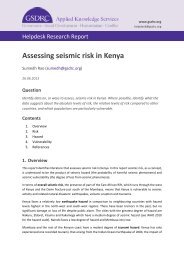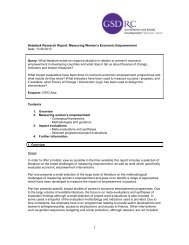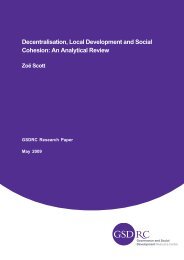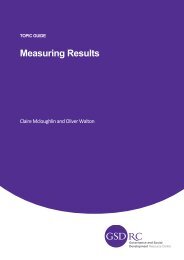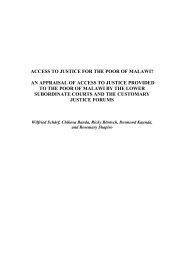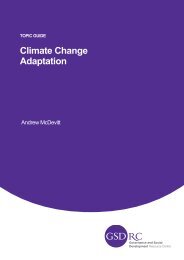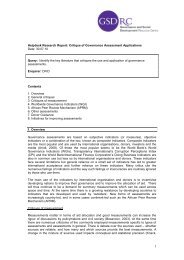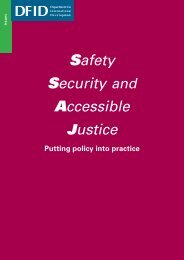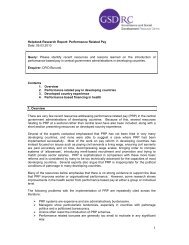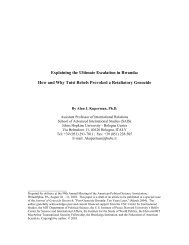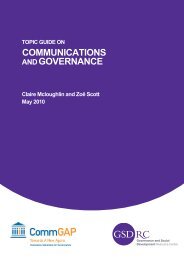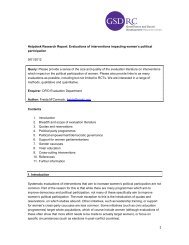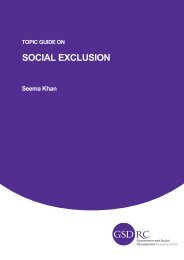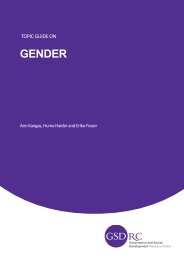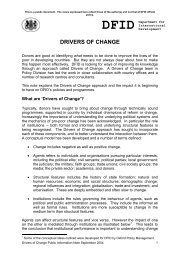State-Society Relations and Citizenship in Situations of ... - GSDRC
State-Society Relations and Citizenship in Situations of ... - GSDRC
State-Society Relations and Citizenship in Situations of ... - GSDRC
Create successful ePaper yourself
Turn your PDF publications into a flip-book with our unique Google optimized e-Paper software.
TOPIC GUIDE SUPPLEMENT<br />
<strong>State</strong>-<strong>Society</strong> <strong>Relations</strong><br />
<strong>and</strong> <strong>Citizenship</strong><br />
<strong>in</strong> <strong>Situations</strong> <strong>of</strong><br />
Conflict <strong>and</strong> Fragility<br />
Huma Haider
<strong>State</strong>-<strong>Society</strong> <strong>Relations</strong> <strong>and</strong> <strong>Citizenship</strong><br />
<strong>in</strong> <strong>Situations</strong> <strong>of</strong> Conflict <strong>and</strong> Fragility<br />
December 2011
About this topic guide supplement<br />
<strong>GSDRC</strong> Topic Guides provide clear, impartial overviews <strong>of</strong> current evidence <strong>and</strong> th<strong>in</strong>k<strong>in</strong>g <strong>in</strong> topic areas relat<strong>in</strong>g to<br />
governance, conflict <strong>and</strong> social development. They <strong>in</strong>troduce key texts, <strong>and</strong> conta<strong>in</strong> l<strong>in</strong>ks to one-page summaries <strong>of</strong><br />
these texts on gsdrc.org.<br />
<strong>State</strong>build<strong>in</strong>g <strong>and</strong> peacebuild<strong>in</strong>g, while conceptually dist<strong>in</strong>ct, are becom<strong>in</strong>g more closely <strong>in</strong>tegrated <strong>in</strong> academic <strong>and</strong><br />
policy circles. This publication is one <strong>of</strong> two supplements to the <strong>GSDRC</strong>’s series <strong>of</strong> Topic Guides that explore this<br />
development:<br />
• <strong>State</strong>build<strong>in</strong>g <strong>and</strong> Peacebuild<strong>in</strong>g <strong>in</strong> <strong>Situations</strong> <strong>of</strong> Conflict <strong>and</strong> Fragility looks at the l<strong>in</strong>ks (<strong>and</strong> tensions)<br />
between statebuild<strong>in</strong>g <strong>and</strong> peacebuild<strong>in</strong>g, how these activities <strong>in</strong>teract, <strong>and</strong> how they can be approached <strong>in</strong><br />
practice.<br />
• <strong>State</strong>-<strong>Society</strong> <strong>Relations</strong> <strong>and</strong> <strong>Citizenship</strong> <strong>in</strong> <strong>Situations</strong> <strong>of</strong> Conflict <strong>and</strong> Fragility looks at concepts <strong>of</strong> statesociety<br />
relations, civic trust, citizenship <strong>and</strong> socio-political cohesion <strong>in</strong> relation to statebuild<strong>in</strong>g <strong>and</strong><br />
peacebuild<strong>in</strong>g.<br />
The publications highlight key issues <strong>and</strong> debates for each topic covered <strong>and</strong> identify relevant references. They are to<br />
be read <strong>in</strong> conjunction with the <strong>GSDRC</strong>’s Conflict <strong>and</strong> Fragile <strong>State</strong>s Topic Guides, <strong>in</strong> particular the Peacebuild<strong>in</strong>g <strong>and</strong><br />
<strong>State</strong>build<strong>in</strong>g chapters. L<strong>in</strong>ks to relevant sections from these <strong>and</strong> other chapters <strong>of</strong> the guides are highlighted<br />
throughout.<br />
These supplements were written by Huma Haider (<strong>GSDRC</strong>). The <strong>GSDRC</strong> appreciates the contributions <strong>of</strong> Al<strong>in</strong>a Rocha<br />
Menochal (Overseas Development Institute); Alex Stevens (DFID) <strong>and</strong> Anna Miles (DFID). Comments, questions or<br />
documents can be sent to Huma Haider: huma@gsdrc.org<br />
About the <strong>GSDRC</strong><br />
The Governance <strong>and</strong> Social Development Resource Centre (<strong>GSDRC</strong>) provides cutt<strong>in</strong>g edge knowledge services on<br />
dem<strong>and</strong> <strong>and</strong> onl<strong>in</strong>e. It aims to help reduce poverty by <strong>in</strong>form<strong>in</strong>g policy <strong>and</strong> practice <strong>in</strong> relation to governance, conflict<br />
<strong>and</strong> social development. The <strong>GSDRC</strong> receives core fund<strong>in</strong>g from the UK Department for International Development<br />
(DFID) <strong>and</strong> from the Australian Agency for International Development (AusAID).<br />
www.gsdrc.org<br />
Governance <strong>and</strong> Social Development Resource Centre (<strong>GSDRC</strong>)<br />
International Development Department<br />
College <strong>of</strong> Social Sciences<br />
University <strong>of</strong> Birm<strong>in</strong>gham, UK<br />
First published 2010<br />
This updated edition published December 2011<br />
© University <strong>of</strong> Birm<strong>in</strong>gham, 2011<br />
<strong>GSDRC</strong>, 2011, <strong>State</strong>-<strong>Society</strong> <strong>Relations</strong> <strong>and</strong> <strong>Citizenship</strong> | About this topic guide supplement 2
Contents<br />
Introduction ..................................................................................................................................... 4<br />
<strong>State</strong>-<strong>Society</strong> <strong>Relations</strong> .................................................................................................................... 6<br />
<strong>State</strong> legitimacy ............................................................................................................................... 9<br />
Interaction between formal <strong>and</strong> <strong>in</strong>formal <strong>in</strong>stitutions ................................................................ 11<br />
<strong>State</strong>lessness .................................................................................................................................. 13<br />
Case studies ......................................................................................................................................... 14<br />
Civic Trust <strong>and</strong> Socio-Political Cohesion ....................................................................................... 15<br />
Intra-society relations ................................................................................................................... 17<br />
Civic trust <strong>and</strong> citizenship .............................................................................................................. 19<br />
Socio-political cohesion <strong>and</strong> nationhood ..................................................................................... 21<br />
3 Contents | <strong>GSDRC</strong>, 2011, <strong>State</strong>-<strong>Society</strong> <strong>Relations</strong> <strong>and</strong> <strong>Citizenship</strong>
Introduction<br />
The impact <strong>of</strong> violent conflict <strong>and</strong> fragility on a country’s society, economy <strong>and</strong> political governance is devastat<strong>in</strong>g <strong>and</strong><br />
encompass<strong>in</strong>g. The effects can be tangible <strong>and</strong> visible, <strong>in</strong>clud<strong>in</strong>g killed <strong>and</strong> <strong>in</strong>jured civilians; destroyed or derelict<br />
<strong>in</strong>frastructure; <strong>and</strong> poor <strong>and</strong> <strong>in</strong>adequate public service facilities. They can also be <strong>in</strong>tangible, such as lack <strong>of</strong><br />
confidence <strong>and</strong> distrust <strong>in</strong> government; weak social cohesion <strong>and</strong> the destruction <strong>of</strong> norms <strong>and</strong> values; pervasive<br />
sense <strong>of</strong> fear, disempowerment <strong>and</strong> <strong>in</strong>security; <strong>and</strong> pessimism about the future. Address<strong>in</strong>g both types <strong>of</strong> effects is<br />
essential <strong>in</strong> conflict-affected <strong>and</strong> fragile contexts. <strong>State</strong>build<strong>in</strong>g <strong>and</strong> peacebuild<strong>in</strong>g processes have <strong>of</strong>ten focused<br />
primarily, however, on the tangible aspects – demobilis<strong>in</strong>g soldiers; improv<strong>in</strong>g <strong>and</strong> restor<strong>in</strong>g physical <strong>in</strong>frastructure,<br />
build<strong>in</strong>gs <strong>and</strong> <strong>in</strong>stitutions; draft<strong>in</strong>g laws <strong>and</strong> constitutions; <strong>and</strong> provid<strong>in</strong>g technical assistance <strong>and</strong> tra<strong>in</strong><strong>in</strong>g (Pouligny,<br />
2010).<br />
Until very recently, efforts undertaken by the <strong>in</strong>ternational community to promote statebuild<strong>in</strong>g have focused on the<br />
state, result<strong>in</strong>g <strong>in</strong> a top-down approach centred on formal <strong>in</strong>stitutions. Those work<strong>in</strong>g <strong>in</strong> peacebuild<strong>in</strong>g, on the other<br />
h<strong>and</strong>, have <strong>of</strong>ten advocated a bottom-up civil society approach. Increas<strong>in</strong>gly, however, statebuild<strong>in</strong>g <strong>and</strong><br />
peacebuild<strong>in</strong>g concepts <strong>and</strong> strategies have evolved <strong>in</strong> ways that have brought them closer together. Establish<strong>in</strong>g<br />
strong public <strong>in</strong>stitutions is now considered essential <strong>in</strong> the promotion <strong>of</strong> peace; <strong>and</strong> develop<strong>in</strong>g <strong>in</strong>stitutions that are<br />
responsive to the dem<strong>and</strong>s <strong>of</strong> citizens <strong>and</strong> <strong>in</strong>clusive processes that treat members <strong>of</strong> society as active agents are<br />
considered important to statebuild<strong>in</strong>g. The concept <strong>of</strong> state-society relations <strong>and</strong> efforts to foster positive, mutually<br />
constructive relations has thus received greater attention. The OECD DAC has emphasised the importance <strong>of</strong> look<strong>in</strong>g<br />
beyond the mere forms <strong>of</strong> <strong>in</strong>stitutions <strong>in</strong> statebuild<strong>in</strong>g processes to state-society relations, state legitimacy <strong>and</strong> the<br />
political <strong>and</strong> social fabric <strong>of</strong> society.<br />
This supplement focuses on these crucial <strong>in</strong>tangible aspects <strong>of</strong> statebuild<strong>in</strong>g <strong>and</strong> peacebuild<strong>in</strong>g: promot<strong>in</strong>g positive<br />
state-society <strong>and</strong> <strong>in</strong>tra-society relations; restor<strong>in</strong>g or generat<strong>in</strong>g trust <strong>in</strong> government <strong>and</strong> public <strong>in</strong>stitutions <strong>and</strong> trust<br />
among citizens; <strong>and</strong> foster<strong>in</strong>g notions <strong>of</strong> citizenship <strong>and</strong> socio-political cohesion. Left unaddressed, statebuild<strong>in</strong>g <strong>and</strong><br />
peacebuild<strong>in</strong>g efforts are unlikely to succeed.<br />
Pouligny, B., 2010, ‘<strong>State</strong>-<strong>Society</strong> <strong>Relations</strong> <strong>and</strong> the Intangible Dimensions <strong>of</strong> <strong>State</strong> Resilience <strong>and</strong> <strong>State</strong>build<strong>in</strong>g: A<br />
Bottom Up Perspective’, EUI Work<strong>in</strong>g Paper, no. 33, Robert Schuman Centre for Advanced Studies, European<br />
University Institute (EUI), Florence<br />
Crucial social <strong>and</strong> cultural elements underp<strong>in</strong> state <strong>in</strong>stitutions <strong>and</strong> ensure that they function. This is especially<br />
important to underst<strong>and</strong> <strong>in</strong> 'fragile' sett<strong>in</strong>gs. This paper argues that conventional perspectives need to be broadened<br />
beyond tangible dimensions <strong>of</strong> state resilience, <strong>in</strong>stitutions <strong>and</strong> statebuild<strong>in</strong>g to <strong>in</strong>clude <strong>in</strong>tangible dimensions.<br />
International actors need to ga<strong>in</strong> an underst<strong>and</strong><strong>in</strong>g <strong>of</strong> the relationships, structures <strong>and</strong> belief systems that underp<strong>in</strong><br />
<strong>in</strong>stitutions, <strong>and</strong> <strong>of</strong> the multiplicity <strong>and</strong> diversity <strong>of</strong> political <strong>in</strong>stitutions, cultures, <strong>and</strong> logics through which<br />
statebuild<strong>in</strong>g processes may be supported.<br />
See one-page summary: http://www.gsdrc.org/go/display&type=Document&id=3903<br />
Interpeace, 2010, ‘Voices <strong>of</strong> Civil <strong>Society</strong> Organisations on Peacebuild<strong>in</strong>g <strong>and</strong> <strong>State</strong>build<strong>in</strong>g’, Background Paper,<br />
prepared as an <strong>in</strong>put <strong>in</strong>to the International Dialogue on Peacebuild<strong>in</strong>g <strong>and</strong> <strong>State</strong>build<strong>in</strong>g, Interpeace, Geneva<br />
What are the views <strong>of</strong> civil society organisations (CSOs) on statebuild<strong>in</strong>g <strong>and</strong> peacebuild<strong>in</strong>g? This report presents the<br />
f<strong>in</strong>d<strong>in</strong>gs <strong>of</strong> a consultation designed to <strong>in</strong>put <strong>in</strong>to the International Dialogue on Peacebuild<strong>in</strong>g <strong>and</strong> <strong>State</strong>build<strong>in</strong>g (Timor-<br />
Leste, April 2010). CSOs argue that the way that peacebuild<strong>in</strong>g <strong>and</strong> statebuild<strong>in</strong>g processes are undertaken is critically<br />
important: there is a need to focus not only on what is done, but how th<strong>in</strong>gs are done. Inclusive <strong>and</strong> participatory<br />
processes are essential <strong>in</strong> order to address conflict <strong>and</strong> to ensure that statebuild<strong>in</strong>g <strong>and</strong> peacebuild<strong>in</strong>g can be<br />
complementary.<br />
See one-page summary: http://www.gsdrc.org/go/display&type=Document&id=3878<br />
World Bank, 2011, 'From Violence to Resilience: Restor<strong>in</strong>g Confidence <strong>and</strong> Transform<strong>in</strong>g Institutions', <strong>in</strong> World<br />
Development Report 2011: Conflict, Security <strong>and</strong> Development, World Bank, Wash<strong>in</strong>gton DC, ch.3<br />
How can countries escape the vicious cycle <strong>of</strong> fragility <strong>and</strong> move toward a virtuous cycle <strong>of</strong> confidence-build<strong>in</strong>g <strong>and</strong><br />
<strong>in</strong>stitutional transformation, especially <strong>in</strong> the areas <strong>of</strong> citizen security, justice, <strong>and</strong> jobs? This chapter sets out the<br />
Report's framework as an exp<strong>and</strong><strong>in</strong>g spiral because these processes repeat over time as countries enter <strong>and</strong> exit<br />
multiple transition moments. Even as one set <strong>of</strong> immediate priorities is resolved, other risks emerge <strong>and</strong> require a<br />
repeated cycle <strong>of</strong> action to bolster <strong>in</strong>stitutional resilience. This process takes at least a generation. Societies<br />
undertak<strong>in</strong>g this endeavour face a legacy <strong>of</strong> pervasive <strong>and</strong> endur<strong>in</strong>g mistrust, which makes collective action to address<br />
challenges or provide public goods difficult. Outsiders cannot restore confidence <strong>and</strong> transform <strong>in</strong>stitutions for<br />
countries because these processes are domestic <strong>and</strong> must be nationally led. But to help countries restore peace <strong>and</strong><br />
reduce regional <strong>and</strong> global <strong>in</strong>stability, <strong>in</strong>ternational actors can provide external support <strong>and</strong> <strong>in</strong>centives <strong>and</strong> help<br />
reduce external stresses.<br />
See one-page summary: http://www.gsdrc.org/go/display&type=Document&id=4108<br />
<strong>GSDRC</strong>, 2011, <strong>State</strong>-<strong>Society</strong> <strong>Relations</strong> <strong>and</strong> <strong>Citizenship</strong> | Introduction 4
World Bank, 2011, 'Restor<strong>in</strong>g Confidence: Mov<strong>in</strong>g Away from the Br<strong>in</strong>k', <strong>in</strong> World Development Report 2011:<br />
Conflict, Security <strong>and</strong> Development, World Bank, Wash<strong>in</strong>gton DC, ch. 4<br />
This chapter reviews lessons from national experience <strong>in</strong> restor<strong>in</strong>g confidence by mobilis<strong>in</strong>g ‘<strong>in</strong>clusive-enough’<br />
coalitions <strong>of</strong> stakeholders <strong>and</strong> by deliver<strong>in</strong>g results. Collaborative coalitions <strong>of</strong>ten comb<strong>in</strong>e government <strong>and</strong><br />
nongovernmental leadership to build national support for change <strong>and</strong> signal an irreversible break with the past.<br />
Restor<strong>in</strong>g confidence <strong>in</strong> situations <strong>of</strong> low trust also means deliver<strong>in</strong>g some fast results, s<strong>in</strong>ce government<br />
announcements <strong>of</strong> change will not be credible without tangible action.<br />
See one-page summary: http://www.gsdrc.org/go/display&type=Document&id=4145<br />
World Bank, 2011, 'Conflict, Security <strong>and</strong> Development: Practical Country Directions <strong>and</strong> Options', <strong>in</strong> World<br />
Development Report 2011, World Bank, Warh<strong>in</strong>gton DC, ch. 8<br />
How have different countries recovered from episodes <strong>of</strong> violence? What practical tools exist for confidence-build<strong>in</strong>g?<br />
This chapter provides basic pr<strong>in</strong>ciples <strong>and</strong> a toolkit <strong>of</strong> options emerg<strong>in</strong>g from country lessons, show<strong>in</strong>g how these can<br />
be adapted to different contexts. Key pr<strong>in</strong>ciples for susta<strong>in</strong>ed violence prevention <strong>and</strong> recovery are: <strong>in</strong>clusion<br />
(although coalitions need not be 'all <strong>in</strong>clusive'); early results to help build citizen confidence; establish<strong>in</strong>g the basic<br />
<strong>in</strong>stitutional functions that provide citizen security, justice, <strong>and</strong> jobs; <strong>and</strong> embrac<strong>in</strong>g pragmatic, best-fit options to<br />
address immediate challenges. With<strong>in</strong> these general pr<strong>in</strong>ciples, each country should tailor their own strategy based<br />
on: the types <strong>of</strong> violent threats faced; <strong>in</strong>stitutional challenges; comb<strong>in</strong>ations <strong>of</strong> <strong>in</strong>ternational <strong>and</strong> external stresses;<br />
stakeholders who need to be <strong>in</strong>volved to make a difference; <strong>and</strong> transition opportunities.<br />
See one-page summary: http://www.gsdrc.org/go/display&type=Document&id=4199<br />
See the contents list <strong>of</strong> the full World Development Report 2011 at: http://wdr2011.worldbank.org/fulltext<br />
5 Introduction | <strong>GSDRC</strong>, 2011, <strong>State</strong>-<strong>Society</strong> <strong>Relations</strong> <strong>and</strong> <strong>Citizenship</strong>
<strong>State</strong>-<strong>Society</strong> <strong>Relations</strong><br />
<strong>State</strong>-society relations is def<strong>in</strong>ed by DFID as ‘<strong>in</strong>teractions between state <strong>in</strong>stitutions <strong>and</strong> societal groups to negotiate<br />
how public authority is exercised <strong>and</strong> how it can be <strong>in</strong>fluenced by people. They are focused on issues such as def<strong>in</strong><strong>in</strong>g<br />
the mutual rights <strong>and</strong> obligations <strong>of</strong> state <strong>and</strong> society, negotiat<strong>in</strong>g how public resources should be allocated <strong>and</strong><br />
establish<strong>in</strong>g different modes <strong>of</strong> representation <strong>and</strong> accountability’ (DFID, 2010, p. 15).<br />
The focus is not on particular <strong>in</strong>stitutional forms but rather on the relations <strong>and</strong> relational functions <strong>of</strong> state <strong>and</strong><br />
society <strong>in</strong>stitutions. Neither the state nor civil society is seen as act<strong>in</strong>g <strong>in</strong> isolation. Rather, the state derives its<br />
legitimacy through its <strong>in</strong>teraction with citizens 1 <strong>and</strong> an organised <strong>and</strong> active civil society. The <strong>Citizenship</strong><br />
Development Research Centre views a citizen as ‘someone with rights, aspirations <strong>and</strong> responsibilities to others <strong>in</strong> the<br />
community <strong>and</strong> to the state. This implies a relationship among citizens, <strong>and</strong> between the state <strong>and</strong> all those liv<strong>in</strong>g<br />
with<strong>in</strong> its borders’ (Benequista, 2010, p. 4). <strong>Citizenship</strong> confers various benefits, <strong>in</strong>clud<strong>in</strong>g the right to enjoy a<br />
nationality; to vote, hold <strong>of</strong>fice <strong>and</strong> participate <strong>in</strong> political processes; to access education, health <strong>and</strong> other goods; to<br />
access the labour market beyond the <strong>in</strong>formal sector; to own bus<strong>in</strong>esses, l<strong>and</strong> <strong>and</strong> other forms <strong>of</strong> property; <strong>and</strong> to<br />
security <strong>of</strong> residence <strong>and</strong> freedom <strong>of</strong> movement.<br />
The nature <strong>of</strong> the political settlement can greatly impact upon state-society relations. In many fragile <strong>and</strong> conflictaffected<br />
states, relations are based on patronage <strong>and</strong> lack <strong>of</strong> accountability. The prom<strong>in</strong>ence <strong>of</strong> <strong>in</strong>formal <strong>in</strong>stitutions<br />
<strong>and</strong> relationships <strong>and</strong> un<strong>of</strong>ficial processes result <strong>in</strong> divergences between formal systems <strong>and</strong> rules <strong>and</strong> actual practice.<br />
Political elites, who benefit from patronage <strong>and</strong> <strong>in</strong>come from natural resource rents <strong>and</strong> crim<strong>in</strong>al activities, <strong>of</strong>ten have<br />
little <strong>in</strong>centive to engage with citizens <strong>and</strong> to build effective public authority. The concentration <strong>of</strong> power <strong>in</strong> a few<br />
elites also limits the participation <strong>of</strong> citizens from public life. In some situations, citizens may be excluded from public<br />
life through state repression <strong>and</strong> violence. This results <strong>in</strong> a legacy <strong>of</strong> negative <strong>and</strong> weak state-society relations. Efforts<br />
to promote an <strong>in</strong>clusive political settlement can re-shape relations <strong>and</strong> contribute to political <strong>and</strong> social<br />
transformation.<br />
Much <strong>of</strong> the focus <strong>in</strong> statebuild<strong>in</strong>g has been on build<strong>in</strong>g the capacity <strong>of</strong> central state <strong>in</strong>stitutions. Attention must also<br />
be paid to support<strong>in</strong>g civil society <strong>and</strong> citizen engagement such that they can hold the state accountable <strong>and</strong> make it<br />
responsive to society. Where donor policy <strong>and</strong> fund<strong>in</strong>g has been directed at both state <strong>and</strong> civil society <strong>in</strong>stitutions,<br />
these <strong>in</strong>terventions have <strong>of</strong>ten been compartmentalised based on a traditional state-civil society divide. Strategies<br />
<strong>and</strong> policies are needed that focus on the <strong>in</strong>teraction between <strong>in</strong>stitutions <strong>and</strong> citizens at all stages <strong>of</strong> war-to-peace<br />
transition, from peace negotiations <strong>and</strong> implementation <strong>of</strong> agreements to post-conflict peacebuild<strong>in</strong>g. The challenge<br />
is to build peace alliances that stretch horizontally <strong>and</strong> vertically between different levels <strong>of</strong> society.<br />
Greater attention also needs to be paid to questions <strong>of</strong> power <strong>and</strong> to alter<strong>in</strong>g elite <strong>in</strong>centives. External actors will f<strong>in</strong>d<br />
it difficult, though, to directly <strong>in</strong>fluence <strong>in</strong>ternal political dynamics. It may thus be more effective to target<br />
<strong>in</strong>ternational behaviour <strong>and</strong> <strong>in</strong>itiatives that affect <strong>in</strong>centives, such as management <strong>of</strong> extractive <strong>in</strong>dustries,<br />
<strong>in</strong>ternational tax evasion <strong>and</strong> corruption. <strong>State</strong>build<strong>in</strong>g approaches also need to go beyond modell<strong>in</strong>g the relationship<br />
between state, elites <strong>and</strong> an undisaggregated 'society', <strong>and</strong> ask who is represented by each group, who participates <strong>in</strong><br />
state-society negotiations, <strong>and</strong> whose dem<strong>and</strong>s are be<strong>in</strong>g expressed? For example, donor approaches to statebuild<strong>in</strong>g<br />
typically have not engaged with exist<strong>in</strong>g knowledge about gender power relations <strong>and</strong> how statebuild<strong>in</strong>g processes<br />
impact women <strong>and</strong> men differently.<br />
Benequista, N., 2010, ‘Putt<strong>in</strong>g Citizens at the Centre: L<strong>in</strong>k<strong>in</strong>g <strong>State</strong>s <strong>and</strong> Societies for Responsive Governance - A<br />
Policy-maker’s Guide to the Research <strong>of</strong> the Development Research Centre on <strong>Citizenship</strong>, Participation <strong>and</strong><br />
Accountability’, Prepared for the DFID Conference on ‘The Politics <strong>of</strong> Poverty, Elites, Citizens <strong>and</strong> <strong>State</strong>s’ 21-23 June,<br />
Sunn<strong>in</strong>gdale, UK<br />
How does citizen engagement contribute to responsive governance? This paper summarises ten years <strong>of</strong> research<br />
from the Development Research Centre on <strong>Citizenship</strong>, Participation, <strong>and</strong> Accountability, present<strong>in</strong>g the key f<strong>in</strong>d<strong>in</strong>gs<br />
<strong>of</strong> more than 150 case studies <strong>of</strong> citizen engagement. It argues that exist<strong>in</strong>g donor programmes fail to recognise the<br />
full potential <strong>of</strong> citizen engagement, result<strong>in</strong>g <strong>in</strong> lack <strong>of</strong> underst<strong>and</strong><strong>in</strong>g <strong>of</strong> the complex relationship between citizens<br />
<strong>and</strong> the state that shapes governance outcomes. Citizens need greater political knowledge <strong>and</strong> awareness <strong>of</strong> rights<br />
<strong>and</strong> <strong>of</strong> agency as a first step to claim<strong>in</strong>g rights <strong>and</strong> act<strong>in</strong>g for themselves. Involvement <strong>in</strong> associations has been an<br />
effective way <strong>of</strong> strengthen<strong>in</strong>g notions <strong>of</strong> citizenship <strong>and</strong> citizen engagement, which can contribute to more<br />
responsive states.<br />
See one-page summary: http://www.gsdrc.org/go/display&type=Document&id=3863<br />
1 The use <strong>of</strong> the term ‘citizen’ <strong>in</strong>stead <strong>of</strong> ‘the poor’ gives more emphasis to the relationship to government <strong>and</strong> to others persons <strong>and</strong><br />
groups <strong>in</strong> society.<br />
<strong>GSDRC</strong>, 2011, <strong>State</strong>-<strong>Society</strong> <strong>Relations</strong> <strong>and</strong> <strong>Citizenship</strong> | <strong>State</strong>-<strong>Society</strong> <strong>Relations</strong> 6
Eyben, R. <strong>and</strong> Ladbury, S., 2006, 'Build<strong>in</strong>g Effective <strong>State</strong>s: Tak<strong>in</strong>g a Citizen's Perspective', Development Research<br />
Centre, <strong>Citizenship</strong>, Participation <strong>and</strong> Accountability, Institute <strong>of</strong> Development Studies, Brighton<br />
How can a citizen-centred approach to development build effective states by improv<strong>in</strong>g relations between state <strong>and</strong><br />
society? This paper gives an overview <strong>of</strong> current debates <strong>and</strong> analyses citizens’ own views on these issues. It argues<br />
that a state’s legitimacy is strengthened by civic participation, which <strong>of</strong>ten grows up around local issues, <strong>and</strong> can be<br />
empowered through donor support.<br />
See one-page summary: http://www.gsdrc.org/go/display&type=Document&id=1994<br />
Fischer, M. 2011, 'Civil <strong>Society</strong> <strong>in</strong> Conflict Transformation: Strengths <strong>and</strong> Limitations,' <strong>in</strong> Aust<strong>in</strong>, B., Fischer, M. <strong>and</strong><br />
Giessmann, H.J., eds. ‘Advanc<strong>in</strong>g Conflict Transformation: The Bergh<strong>of</strong> H<strong>and</strong>book II’, Barbara Budrich Publishers,<br />
Opladen/Fram<strong>in</strong>gton Hills<br />
What problems <strong>and</strong> dilemmas are faced <strong>in</strong> the development <strong>of</strong> civil society <strong>in</strong> war-torn societies? What types <strong>of</strong><br />
activities do NGOs undertake <strong>and</strong> what are their strengths <strong>and</strong> limitations? This chapter focuses on the potential<br />
contribution that civil society actors can make to peacebuild<strong>in</strong>g, draw<strong>in</strong>g on lessons from Bosnia-Herzegov<strong>in</strong>a. It<br />
argues that support for civil society should be further developed as a key element <strong>of</strong> development <strong>and</strong> peace politics,<br />
particularly <strong>in</strong> post-war contexts.<br />
See one-page summary: http://www.gsdrc.org/go/display&type=Document&id=4198<br />
Cornwall, A., Rob<strong>in</strong>s, S. <strong>and</strong> Von Lieres, B., 2011, ‘<strong>State</strong>s <strong>of</strong> <strong>Citizenship</strong>: Contexts <strong>and</strong> Cultures <strong>of</strong> Public Engagement<br />
<strong>and</strong> Citizen Action’, Work<strong>in</strong>g Paper 364, IDS, Brighton<br />
What is the nature <strong>of</strong> the citizen-state relationship <strong>and</strong> how do different k<strong>in</strong>ds <strong>of</strong> states make different k<strong>in</strong>ds <strong>of</strong><br />
citizenship possible? Draw<strong>in</strong>g on case studies from the <strong>Citizenship</strong> Development Research Centre, this paper contends<br />
that mechanisms aimed at enhanc<strong>in</strong>g citizen engagement need to be contextualised <strong>in</strong> the states <strong>of</strong> citizenship <strong>in</strong><br />
which they are applied. It calls for more attention to be focused on underst<strong>and</strong><strong>in</strong>g trajectories <strong>of</strong> citizenship<br />
experience <strong>and</strong> practice <strong>in</strong> particular k<strong>in</strong>ds <strong>of</strong> states. It suggests that whilst efforts have been made by donors to get to<br />
grips with history <strong>and</strong> context, less attention has been given to explor<strong>in</strong>g the implications <strong>of</strong> the dissonance between<br />
the normative dimensions <strong>of</strong> global narratives <strong>of</strong> participation <strong>and</strong> accountability, <strong>and</strong> the lived experience <strong>of</strong> civic<br />
engagement <strong>and</strong> the empirical realities <strong>of</strong> ‘civil society’ <strong>in</strong> diverse k<strong>in</strong>ds <strong>of</strong> states. By explor<strong>in</strong>g <strong>in</strong>stantiations <strong>of</strong><br />
citizenship <strong>in</strong> different k<strong>in</strong>ds <strong>of</strong> states, the paper reflects on what citizen engagement comes to imply <strong>in</strong> these<br />
contexts. In do<strong>in</strong>g so, it draws attention to the diverse ways <strong>in</strong> which particular subject-positions <strong>and</strong> forms <strong>of</strong><br />
identification are articulated <strong>in</strong> the pursuit <strong>of</strong> concrete social <strong>and</strong> political projects.<br />
http://onl<strong>in</strong>elibrary.wiley.com/doi/10.1111/j.2040-0209.2011.00363_2.x/pdf<br />
See also a two-page IDS research summary <strong>of</strong> this paper: http://www.ids.ac.uk/files/dmfile/Rs363.pdf<br />
Castillejo, C., 2011, 'Build<strong>in</strong>g a <strong>State</strong> that Works for Women: Integrat<strong>in</strong>g Gender <strong>in</strong>to Post-Conflict <strong>State</strong> Build<strong>in</strong>g',<br />
FRIDE, Madrid<br />
What role do women play <strong>in</strong> statebuild<strong>in</strong>g? How do statebuild<strong>in</strong>g processes affect women's participation? Support for<br />
statebuild<strong>in</strong>g has become the dom<strong>in</strong>ant model for <strong>in</strong>ternational engagement <strong>in</strong> post-conflict contexts, yet donor<br />
approaches lack substantial gender analysis <strong>and</strong> are miss<strong>in</strong>g opportunities to promote gender equality. This paper<br />
presents f<strong>in</strong>d<strong>in</strong>gs from a research project on the impact <strong>of</strong> post-conflict statebuild<strong>in</strong>g on women's citizenship. It<br />
argues that gender <strong>in</strong>equalities are l<strong>in</strong>ked to the underly<strong>in</strong>g political settlement, <strong>and</strong> that donors must therefore<br />
address gender as a fundamentally political issue.<br />
See one-page summary: http://www.gsdrc.org/go/display&type=Document&id=4112<br />
Unsworth, S., 2010, An Upside Down View <strong>of</strong> Governance, Institute <strong>of</strong> Development Studies, Brighton<br />
How can effective, accountable public authority be <strong>in</strong>creased? This paper synthesises research f<strong>in</strong>d<strong>in</strong>gs from the<br />
Centre for the Future <strong>State</strong>. It explores how public authority is created through processes <strong>of</strong> barga<strong>in</strong><strong>in</strong>g between state<br />
<strong>and</strong> society actors, <strong>and</strong> the <strong>in</strong>teraction <strong>of</strong> formal <strong>and</strong> <strong>in</strong>formal <strong>in</strong>stitutions. F<strong>in</strong>d<strong>in</strong>gs highlight the need for a<br />
fundamental reassessment <strong>of</strong> exist<strong>in</strong>g assumptions about governance <strong>and</strong> development. Informal <strong>in</strong>stitutions <strong>and</strong><br />
personalised relationships are pervasive <strong>and</strong> powerful, but they can contribute to progressive as well as to regressive<br />
outcomes. Rather than focus<strong>in</strong>g on rules-based reform, policymakers should consider us<strong>in</strong>g <strong>in</strong>direct strategies to<br />
<strong>in</strong>fluence local actors.<br />
See one-page summary: http://www.gsdrc.org/go/display&type=Document&id=3849<br />
DFID, 2010, ‘Build<strong>in</strong>g Peaceful <strong>State</strong>s <strong>and</strong> Societies: A DFID Practice Paper’, Department for International<br />
Development, London<br />
http://www.gsdrc.org/docs/open/CON75.pdf<br />
Initiative for Peacebuild<strong>in</strong>g, 2008, ‘<strong>State</strong>-<strong>Society</strong> Analytical Framework’, Democratisation <strong>and</strong> Transitional Justice<br />
Cluster, Initiative for Peacebuild<strong>in</strong>g<br />
http://www.<strong>in</strong>itiativeforpeacebuild<strong>in</strong>g.eu/resources/<strong>State</strong>_<strong>Society</strong>_Analytical_Framework.pdf<br />
Magalhães Ferreira, P., 2009, ‘<strong>State</strong>-<strong>Society</strong> <strong>Relations</strong> <strong>in</strong> Angola: Peacebuild<strong>in</strong>g, Democracy <strong>and</strong> Political<br />
Participation’, Democratisation <strong>and</strong> Transitional Justice Cluster, Initiative for Peacebuild<strong>in</strong>g<br />
http://www.<strong>in</strong>itiativeforpeacebuild<strong>in</strong>g.eu/pdf/<strong>State</strong>_<strong>Society</strong>_<strong>Relations</strong>_<strong>in</strong>_Angola.pdf<br />
7 <strong>State</strong>-<strong>Society</strong> <strong>Relations</strong> | <strong>GSDRC</strong>, 2011, <strong>State</strong>-<strong>Society</strong> <strong>Relations</strong> <strong>and</strong> <strong>Citizenship</strong>
Additional resources<br />
For discussion <strong>and</strong> resources on weak state-society relations as a characteristic <strong>of</strong> fragility, see Chapter 2 (Causes <strong>and</strong><br />
characteristics <strong>of</strong> fragility) <strong>of</strong> the fragile states topic guide.<br />
http://www.gsdrc.org/go/chapter-2--causes-<strong>and</strong>-characteristics-<strong>of</strong>-fragility/fragile-states/social-<strong>and</strong>-<strong>in</strong>ternationalcauses-<strong>and</strong>-characteristics#soc<br />
For discussion <strong>and</strong> resources on strengthen<strong>in</strong>g citizen engagement <strong>in</strong> statebuild<strong>in</strong>g processes, see strategies for<br />
external engagement <strong>in</strong> Chapter 5 (<strong>State</strong>build<strong>in</strong>g <strong>in</strong> fragile contexts) <strong>of</strong> the fragile states guide.<br />
http://www.gsdrc.org/go/fragile-states/chapter-5--state-build<strong>in</strong>g-<strong>in</strong>-fragile-contexts/strategies-for-externalengagement#citizen<br />
For discussion <strong>and</strong> resources on political settlements, see:<br />
Inclusive political settlements <strong>and</strong> peace processes <strong>in</strong> the ‘<strong>State</strong>build<strong>in</strong>g <strong>and</strong> peacebuild<strong>in</strong>g <strong>in</strong> situations <strong>of</strong> conflict<br />
<strong>and</strong> fragility’ supplement<br />
http://www.gsdrc.org/docs/open/CON87.pdf<br />
Political Settlements <strong>in</strong> Chapter 5 <strong>of</strong> the fragile states guide<br />
http://www.gsdrc.org/go/fragile-states/chapter-5--state-build<strong>in</strong>g-<strong>in</strong>-fragile-contexts/state-functions-<strong>and</strong>legitimacy#political<br />
Peace Agreements <strong>in</strong> Chapter 3 (Prevent<strong>in</strong>g <strong>and</strong> manag<strong>in</strong>g violent conflict) <strong>of</strong> the conflict guide<br />
http://www.gsdrc.org/go/conflict/chapter-3-prevent<strong>in</strong>g-<strong>and</strong>-manag<strong>in</strong>g-violent-conflict/end<strong>in</strong>g-violent-conflict-peaceagreements-<strong>and</strong>-conflict-transformation#peace<br />
<strong>GSDRC</strong>, 2011, <strong>State</strong>-<strong>Society</strong> <strong>Relations</strong> <strong>and</strong> <strong>Citizenship</strong> | <strong>State</strong>-<strong>Society</strong> <strong>Relations</strong> 8
<strong>State</strong> legitimacy<br />
<strong>State</strong> legitimacy is a key aspect <strong>of</strong> state-society relations. <strong>State</strong> repression <strong>and</strong> violence, which occurs <strong>in</strong> many<br />
conflict-affected contexts, results <strong>in</strong> negative experiences <strong>of</strong> citizens with the state, a legacy <strong>of</strong> mistrust, <strong>and</strong> rejection<br />
<strong>of</strong> the legitimacy <strong>of</strong> state <strong>in</strong>stitutions. In situations <strong>of</strong> fragility, the <strong>in</strong>ability or unwill<strong>in</strong>gness <strong>of</strong> states to provide for the<br />
welfare <strong>of</strong> citizens <strong>and</strong> to improve st<strong>and</strong>ards <strong>of</strong> liv<strong>in</strong>g has also underm<strong>in</strong>ed trust between the state <strong>and</strong> society <strong>and</strong><br />
legitimacy. The development <strong>of</strong> state capacity to manage compet<strong>in</strong>g <strong>in</strong>terests <strong>and</strong> to be responsive to citizen’s needs<br />
thus has the potential to improve legitimacy.<br />
<strong>State</strong> legitimacy can derive from a range <strong>of</strong> sources, <strong>in</strong>clud<strong>in</strong>g the effectiveness <strong>of</strong> public <strong>in</strong>stitutions <strong>in</strong> their<br />
performance <strong>of</strong> various functions, such as service delivery, taxation <strong>and</strong> social protection systems; <strong>and</strong> their degree <strong>of</strong><br />
representation <strong>and</strong> accountability. Legitimacy does not derive solely from effectively function<strong>in</strong>g <strong>in</strong>stitutions,<br />
however. Such <strong>in</strong>stitutions must also resonate with societies <strong>in</strong> order for them to be considered legitimate <strong>and</strong> to<br />
become embedded <strong>in</strong> society. This <strong>in</strong>volves the penetration <strong>of</strong> the state <strong>in</strong>to society such that citizens take the<br />
presence <strong>of</strong> the state <strong>and</strong> its rules for granted; they accept the state’s right to rule <strong>and</strong> its position as the highest<br />
political authority.<br />
While <strong>in</strong>ternational development actors can assist <strong>in</strong> develop<strong>in</strong>g state capacity such that they can be responsive to<br />
society, their ability to directly affect legitimacy is limited. <strong>State</strong> <strong>in</strong>stitutions advocated by external actors <strong>of</strong>ten<br />
correspond with Western state practices. These may not fit with local context <strong>and</strong> historical processes <strong>and</strong> may not be<br />
socially, politically or culturally appropriate. In such cases, the <strong>in</strong>stitutions are unlikely to be perceived as legitimate<br />
<strong>and</strong> to contribute to positive state-society relations.<br />
Donors should <strong>in</strong>vest more <strong>in</strong> underst<strong>and</strong><strong>in</strong>g socio-political contexts, how local societies relate to the state <strong>and</strong> how<br />
historical <strong>and</strong> cultural factors shape public perceptions. They should seek to engage with communities <strong>and</strong> non-state<br />
<strong>in</strong>stitutions. This would contribute to an awareness <strong>of</strong> <strong>in</strong>stitutions that resonate with the population <strong>and</strong> the<br />
conditions <strong>in</strong> which state legitimacy is likely <strong>and</strong> unlikely to develop.<br />
OECD, 2010, ‘The <strong>State</strong>’s Legitimacy <strong>in</strong> Fragile <strong>Situations</strong>: Unpack<strong>in</strong>g Complexity’, Organisation for Economic Cooperation<br />
<strong>and</strong> Development, Paris<br />
<strong>State</strong> legitimacy provides the basis for rule by consent rather than coercion, but <strong>in</strong> fragile situations multiple,<br />
conflict<strong>in</strong>g sources <strong>of</strong> legitimacy co-exist. How can the complex <strong>in</strong>teractions between these different sources be better<br />
understood <strong>and</strong> constructively comb<strong>in</strong>ed? Donors should pay particular attention to: (a) legitimacy deriv<strong>in</strong>g from<br />
shared beliefs <strong>and</strong> traditions; <strong>and</strong> (b) the processes <strong>of</strong> state-society <strong>in</strong>teraction that nurture state capacity <strong>and</strong><br />
legitimacy. Try<strong>in</strong>g to strengthen state capacity <strong>and</strong> legitimacy <strong>in</strong> very fragile environments by support<strong>in</strong>g the creation<br />
<strong>of</strong> rational-legal political <strong>in</strong>stitutions will not work.<br />
See one-page summary: http://www.gsdrc.org/go/display&type=Document&id=3767<br />
Lemay-Hébert, N., 2009, ‘<strong>State</strong>build<strong>in</strong>g without Nation-build<strong>in</strong>g? Legitimacy, <strong>State</strong> Failure <strong>and</strong> the Limits <strong>of</strong> the<br />
Institutionalist Approach’, Journal <strong>of</strong> Intervention <strong>and</strong> <strong>State</strong>build<strong>in</strong>g’, vol. 3, no. 1, pp. 21-45<br />
What is state collapse <strong>and</strong> how should external actors address it? This essay reviews the literature, outl<strong>in</strong><strong>in</strong>g the<br />
'<strong>in</strong>stitutional' <strong>and</strong> 'legitimacy' approaches to the state <strong>and</strong> statebuild<strong>in</strong>g that emerge. It argues that to be effective,<br />
statebuild<strong>in</strong>g needs to consider both the efficiency <strong>of</strong> state <strong>in</strong>stitutions <strong>and</strong> their legitimacy, (<strong>and</strong> <strong>in</strong> terms <strong>of</strong> the<br />
latter, the impact <strong>of</strong> external <strong>in</strong>tervention on socio-political cohesion, or 'nation-build<strong>in</strong>g'). <strong>State</strong>build<strong>in</strong>g <strong>and</strong> nationbuild<strong>in</strong>g<br />
should thus be understood as a s<strong>in</strong>gle process, <strong>in</strong> which local ownership <strong>and</strong> perceptions are vital.<br />
See one-page summary: http://www.gsdrc.org/go/display&type=Document&id=3855<br />
Roberts, D., 2008, ‘Post-conflict <strong>State</strong>build<strong>in</strong>g <strong>and</strong> <strong>State</strong> Legitimacy: From Negative to Positive Peace?’,<br />
Development <strong>and</strong> Change, vol. 39, no. 4, pp. 537-555<br />
What is the potential for statebuild<strong>in</strong>g <strong>in</strong>terventions to foster domestic legitimacy? This article advocates a shift <strong>in</strong><br />
current approaches to statebuild<strong>in</strong>g. Rather than <strong>in</strong>sert<strong>in</strong>g modern <strong>in</strong>stitutions that create external legitimacy,<br />
statebuild<strong>in</strong>g should focus on clos<strong>in</strong>g the gap between civil society <strong>and</strong> the state. More emphasis should be placed on<br />
build<strong>in</strong>g domestic legitimacy by fulfill<strong>in</strong>g basic welfare needs. This approach would stimulate local-level state<br />
legitimacy while formalis<strong>in</strong>g social justice <strong>and</strong> positive peacebuild<strong>in</strong>g.<br />
See one-page summary: http://www.gsdrc.org/go/display&type=Document&id=3864<br />
HelpAge International, 2011, ‘Strengthen<strong>in</strong>g <strong>State</strong>-Citizen <strong>Relations</strong> <strong>in</strong> Fragile Contexts: The Role <strong>of</strong> Cash Transfers’,<br />
Brief<strong>in</strong>g no. 3, HelpAge International<br />
What is the role <strong>of</strong> cash transfers <strong>in</strong> strengthen<strong>in</strong>g state-citizen relations <strong>in</strong> the context <strong>of</strong> long-term development <strong>in</strong><br />
fragile states <strong>and</strong> situations? Us<strong>in</strong>g examples based on 18 months research consist<strong>in</strong>g <strong>of</strong> desk study <strong>in</strong> London <strong>and</strong><br />
field work undertaken <strong>in</strong> Sierra Leone, northern Kenya <strong>and</strong> Sudan, the report argues that social protection<br />
programmes <strong>in</strong> the form <strong>of</strong> cash transfers, if well designed, could play a significant role <strong>in</strong> strengthen<strong>in</strong>g state-citizen<br />
relations. The nature <strong>of</strong> programme design <strong>and</strong> programme ownership is critical to shap<strong>in</strong>g this relationship, which is<br />
9 <strong>State</strong> legitimacy | <strong>GSDRC</strong>, 2011, <strong>State</strong>-<strong>Society</strong> <strong>Relations</strong> <strong>and</strong> <strong>Citizenship</strong>
<strong>of</strong> crucial importance <strong>in</strong> fragile contexts.<br />
http://www.pension-watch.net/download/4dc156c8e9b94<br />
Prichard, W., 2010, ‘Citizen-<strong>State</strong> <strong>Relations</strong>: Improv<strong>in</strong>g Governance through Tax Reform’, OECD, Paris<br />
How can tax reform enhance citizen-state relations? This report exam<strong>in</strong>es the role <strong>of</strong> taxation <strong>in</strong> build<strong>in</strong>g more<br />
responsive <strong>and</strong> accountable government, <strong>and</strong> <strong>in</strong> exp<strong>and</strong><strong>in</strong>g state capacity. It f<strong>in</strong>ds that the specific character <strong>of</strong> tax<br />
systems <strong>and</strong> <strong>of</strong> tax reform is very important to strengthen<strong>in</strong>g connections between taxation <strong>and</strong> broader governance<br />
ga<strong>in</strong>s. Governments <strong>and</strong> donors can strengthen tax-governance l<strong>in</strong>ks through three types <strong>of</strong> actions: 1) specific<br />
measures to enhance <strong>and</strong> re-orient the dom<strong>in</strong>ant tax reform agenda; 2) support for civil society actors to engage <strong>in</strong><br />
debates about tax issues; <strong>and</strong> 3) manag<strong>in</strong>g the provision <strong>of</strong> aid <strong>in</strong> ways that maximise positive revenue-rais<strong>in</strong>g<br />
<strong>in</strong>centives <strong>and</strong> local accountability.<br />
See one-page summary: http://www.gsdrc.org/go/display&type=Document&id=4196<br />
Additional resources<br />
For further discussion <strong>and</strong> resources on state legitimacy, see Chapter 5 (<strong>State</strong>build<strong>in</strong>g <strong>in</strong> fragile contexts) <strong>of</strong> the fragile<br />
states topic guide.<br />
http://www.gsdrc.org/go/fragile-states/chapter-5--state-build<strong>in</strong>g-<strong>in</strong>-fragile-contexts/state-functions-<strong>and</strong>-legitimacy<br />
<strong>GSDRC</strong>, 2011, <strong>State</strong>-<strong>Society</strong> <strong>Relations</strong> <strong>and</strong> <strong>Citizenship</strong> | <strong>State</strong> legitimacy 10
Interaction between formal <strong>and</strong> <strong>in</strong>formal <strong>in</strong>stitutions<br />
While formal state <strong>in</strong>stitutions may be weak or deemed illegitimate <strong>in</strong> fragile <strong>and</strong> conflict-affected contexts, there are<br />
<strong>of</strong>ten <strong>in</strong>formal <strong>in</strong>stitutions that persist <strong>and</strong> reta<strong>in</strong> legitimacy. These <strong>in</strong>stitutions are diverse <strong>and</strong> may <strong>in</strong>clude<br />
community mechanisms or customary local governance <strong>in</strong>stitutions. Often, they fulfil some <strong>of</strong> the functions expected<br />
<strong>of</strong> the state.<br />
<strong>State</strong>build<strong>in</strong>g <strong>in</strong>itiatives have <strong>of</strong>ten focused primarily on formal <strong>in</strong>stitutions <strong>and</strong> their capacities at the central level,<br />
sidel<strong>in</strong><strong>in</strong>g sub-state <strong>and</strong> <strong>in</strong>formal <strong>in</strong>stitutions. This has prevented the evolution <strong>of</strong> an organic process <strong>of</strong> reform driven<br />
by local actors that could allow for greater resonance <strong>and</strong> legitimacy with citizens. There is a grow<strong>in</strong>g awareness <strong>of</strong> a<br />
need to pay attention to exist<strong>in</strong>g <strong>in</strong>formal <strong>in</strong>stitutions. This may stem from pragmatic acceptance <strong>of</strong> their existence; a<br />
recognition that they represent local culture <strong>and</strong> practice; <strong>and</strong>/or the view that they can provide a bridge between<br />
state <strong>and</strong> society. Informal <strong>in</strong>stitutions may improve public service delivery; help stimulate <strong>in</strong>vestment; facilitate the<br />
transition to more <strong>in</strong>clusive, rules-based governance; <strong>and</strong> promote social reconciliation <strong>in</strong> situations <strong>of</strong> conflict.<br />
In some cases, <strong>in</strong>formal local governance <strong>in</strong>stitutions can work synergistically with formal <strong>in</strong>stitutions. In other cases,<br />
however, they may compete with formal <strong>in</strong>stitutions <strong>in</strong> negative ways <strong>and</strong> underm<strong>in</strong>e them, particularly <strong>in</strong> the case <strong>of</strong><br />
patronage networks. Critics view such <strong>in</strong>formal <strong>in</strong>stitutions as underm<strong>in</strong><strong>in</strong>g norms <strong>of</strong> governance <strong>and</strong> citizenship.<br />
Further, local <strong>and</strong> <strong>in</strong>formal <strong>in</strong>stitutions may not necessarily function better than the state <strong>and</strong> can <strong>in</strong> some cases be<br />
discrim<strong>in</strong>atory, particularly towards women <strong>and</strong> youth. Work<strong>in</strong>g with <strong>in</strong>formal actors does not necessarily mean<br />
endorsement though if donors can engage <strong>in</strong> dialogue with them with a view to secur<strong>in</strong>g <strong>in</strong>clusive rights. The key to<br />
adopt<strong>in</strong>g an <strong>in</strong>stitutionally diverse approach <strong>in</strong> statebuild<strong>in</strong>g <strong>and</strong> peacebuild<strong>in</strong>g processes is to avoid competition<br />
between <strong>in</strong>formal <strong>and</strong> formal state <strong>in</strong>stitutions. It is important to underst<strong>and</strong> the conditions <strong>in</strong> which they can be<br />
beneficially l<strong>in</strong>ked.<br />
Unsworth, S., 2010, An Upside Down View <strong>of</strong> Governance, Institute <strong>of</strong> Development Studies, Brighton<br />
How can effective, accountable public authority be <strong>in</strong>creased? This paper synthesises research f<strong>in</strong>d<strong>in</strong>gs from the<br />
Centre for the Future <strong>State</strong>. It explores how public authority is created through processes <strong>of</strong> barga<strong>in</strong><strong>in</strong>g between state<br />
<strong>and</strong> society actors, <strong>and</strong> the <strong>in</strong>teraction <strong>of</strong> formal <strong>and</strong> <strong>in</strong>formal <strong>in</strong>stitutions. F<strong>in</strong>d<strong>in</strong>gs highlight the need for a<br />
fundamental reassessment <strong>of</strong> exist<strong>in</strong>g assumptions about governance <strong>and</strong> development. Informal <strong>in</strong>stitutions <strong>and</strong><br />
personalised relationships are pervasive <strong>and</strong> powerful, but they can contribute to progressive as well as to regressive<br />
outcomes. Rather than focus<strong>in</strong>g on rules-based reform, policymakers should consider us<strong>in</strong>g <strong>in</strong>direct strategies to<br />
<strong>in</strong>fluence local actors.<br />
See one-page summary: http://www.gsdrc.org/go/display&type=Document&id=3849<br />
Heathershaw, J. <strong>and</strong> Lambach, D., 2008, ‘Introduction: Post-Conflict Spaces <strong>and</strong> Approaches to <strong>State</strong>build<strong>in</strong>g’,<br />
Journal <strong>of</strong> Intervention <strong>and</strong> <strong>State</strong>build<strong>in</strong>g, vol. 2, no. 3, pp. 269-289<br />
What can an analysis <strong>of</strong> 'space' <strong>in</strong> post-conflict situations tell us about exist<strong>in</strong>g theoretical approaches to statebuild<strong>in</strong>g<br />
<strong>and</strong> peacebuild<strong>in</strong>g? This article argues that post-conflict spaces have to be understood as fields <strong>of</strong> power where<br />
sovereignty is constantly contested <strong>and</strong> negotiated among global, elite <strong>and</strong> local actors. Underst<strong>and</strong><strong>in</strong>g these spaces<br />
means break<strong>in</strong>g out <strong>of</strong> the dom<strong>in</strong>ant liberal peace model <strong>and</strong> 's<strong>in</strong>gle sovereign' framework. It requires recognition <strong>of</strong><br />
the resilience <strong>of</strong> local space <strong>and</strong> importance <strong>of</strong> elite-subord<strong>in</strong>ate dynamics <strong>of</strong> patronage <strong>and</strong> <strong>in</strong>formal structures <strong>of</strong><br />
authority. This makes it possible to discern some <strong>of</strong> the logics that govern how power <strong>and</strong> space shape each other <strong>in</strong><br />
post-conflict sett<strong>in</strong>gs.<br />
See one-page summary: http://www.gsdrc.org/go/display&type=Document&id=3871<br />
Giovannetti, G. et al., 2009, ‘<strong>State</strong>build<strong>in</strong>g <strong>and</strong> Social Cohesion’, Chapter 7 <strong>in</strong> European Report on Development:<br />
Overcom<strong>in</strong>g Fragility <strong>in</strong> Africa – Forg<strong>in</strong>g a New European Approach, European Communities, Brussels, pp. 90-103<br />
How can the <strong>in</strong>ternational community help national reformers to build effective, legitimate <strong>and</strong> resilient states <strong>in</strong> postconflict<br />
sett<strong>in</strong>gs? This chapter discusses the complex <strong>in</strong>tangible dimensions <strong>of</strong> state-build<strong>in</strong>g – state-society relations<br />
<strong>and</strong> negotiation processes. It argues that build<strong>in</strong>g the capacity <strong>of</strong> formal <strong>in</strong>stitutions needs to be complemented by<br />
actions that take <strong>in</strong>to account the roles <strong>of</strong> perceptions <strong>and</strong> expectations, <strong>of</strong> bottom-up consultations <strong>and</strong> <strong>of</strong> the<br />
degree to which populations feel represented by public <strong>in</strong>stitutions. It recommends a gradual, long-term <strong>and</strong> socioculturally<br />
engaged approach to state-build<strong>in</strong>g, which external actors may support but not lead.<br />
See one-page summary: http://www.gsdrc.org/go/display&type=Document&id=3909<br />
Fischer, M. <strong>and</strong> Schmelzle, B., eds., 2009, Build<strong>in</strong>g Peace <strong>in</strong> the Absence <strong>of</strong> <strong>State</strong>s: Challeng<strong>in</strong>g the Discourse on<br />
<strong>State</strong> Failure, Bergh<strong>of</strong> H<strong>and</strong>book Dialogue Series, no. 8, Bergh<strong>of</strong> Research Center, Berl<strong>in</strong><br />
http://bergh<strong>of</strong>-h<strong>and</strong>book.net/documents/publications/dialogue8_fail<strong>in</strong>gstates_complete.pdf<br />
11 Interaction between formal <strong>and</strong> <strong>in</strong>formal <strong>in</strong>stitutions | <strong>GSDRC</strong>, 2011, <strong>State</strong>-<strong>Society</strong> <strong>Relations</strong> <strong>and</strong> <strong>Citizenship</strong>
Additional resources<br />
For further discussion <strong>and</strong> resources on non-state actors, see:<br />
Work<strong>in</strong>g with<strong>in</strong> local contexts <strong>and</strong> <strong>in</strong>stitutions <strong>in</strong> Chapter 5 (<strong>State</strong>build<strong>in</strong>g <strong>in</strong> fragile contexts) <strong>of</strong> the fragile states<br />
topic guide.<br />
http://www.gsdrc.org/go/fragile-states/chapter-5--state-build<strong>in</strong>g-<strong>in</strong>-fragile-contexts/strategies-for-externalengagement#local<br />
Non-state actors <strong>and</strong> peacebuild<strong>in</strong>g <strong>in</strong> Chapter 4 (Recover<strong>in</strong>g from violent conflict) <strong>of</strong> the conflict guide.<br />
http://www.gsdrc.org/go/chapter-4-recover<strong>in</strong>g-from-violent-conflict/conflict/peacebuild<strong>in</strong>g-non-state-actors-<strong>and</strong>peacebuild<strong>in</strong>g<br />
See also: resources from the Africa power <strong>and</strong> politics programme (Overseas Development Institute), which looks at<br />
the relationship between formal <strong>and</strong> <strong>in</strong>formal <strong>in</strong>stitutions <strong>and</strong> whether <strong>and</strong> how <strong>in</strong>formal <strong>in</strong>stitutions may be<br />
harnessed to improve development.<br />
http://www.<strong>in</strong>stitutions-africa.org<br />
<strong>GSDRC</strong>, 2011, <strong>State</strong>-<strong>Society</strong> <strong>Relations</strong> <strong>and</strong> <strong>Citizenship</strong> | Interaction between formal <strong>and</strong> <strong>in</strong>formal <strong>in</strong>stitutions 12
<strong>State</strong>lessness<br />
‘<strong>State</strong>lessness’, <strong>in</strong> a strictly legal sense, refers to <strong>in</strong>dividuals or groups who are not considered nationals by any state.<br />
Such persons have few rights <strong>in</strong> a state-driven <strong>in</strong>ternational system. Individuals <strong>and</strong> groups may become stateless<br />
through forced migration, dur<strong>in</strong>g periods <strong>of</strong> violent conflict <strong>and</strong>/or political transition. Their statelessness may persist<br />
from the absence <strong>of</strong> rule <strong>of</strong> law <strong>in</strong> weak states with poor governance. Citizens can also lose citizenship through<br />
revocation or withdrawal. This can stem from exclusive nationalist ideologies dur<strong>in</strong>g periods <strong>of</strong> political unrest <strong>and</strong><br />
can be used as a tool <strong>of</strong> war.<br />
<strong>State</strong>lessness can also result from the denial <strong>of</strong> ‘effective’ exercise <strong>of</strong> citizenship rights even where <strong>in</strong>dividuals <strong>and</strong><br />
groups hold legal citizenship. Discrim<strong>in</strong>ation aga<strong>in</strong>st specific m<strong>in</strong>ority groups through exclusionary state rules, norms<br />
<strong>and</strong> practices can deny them from access<strong>in</strong>g their rights. Ethnic identity or gender, for example, rather than<br />
citizenship identity, can determ<strong>in</strong>e access to state entitlements <strong>and</strong> social rights.<br />
The irregular distribution <strong>of</strong> citizenship <strong>and</strong> the failure <strong>of</strong> the state to represent the <strong>in</strong>terests <strong>of</strong> all citizens is likely to<br />
impact upon societal stability <strong>and</strong> the probability <strong>of</strong> conflict. Denial <strong>of</strong> citizenship <strong>and</strong> exclusion deprives the stateless<br />
<strong>and</strong> marg<strong>in</strong>alised from key goods <strong>and</strong> may result <strong>in</strong> lack <strong>of</strong> trust <strong>in</strong> state <strong>in</strong>stitutions. It may also result <strong>in</strong> a sense <strong>of</strong><br />
humiliation <strong>and</strong> alienation that can transform <strong>in</strong>to group mobilisation <strong>and</strong> fuel violent conflict.<br />
Sub-state level <strong>in</strong>stitutions can also be exclusionary. In some cases, citizenship may be <strong>in</strong>clusive at the national level<br />
while local-level governance may rema<strong>in</strong> exclusive – result<strong>in</strong>g <strong>in</strong> a multi-tiered citizenship structure. In many African<br />
countries, for example, women have little contact with the formal state <strong>and</strong> are constra<strong>in</strong>ed <strong>in</strong> their exercise <strong>of</strong><br />
citizenship rights. Many aspects <strong>of</strong> their lives are governed <strong>in</strong>stead by local, customary systems that <strong>of</strong>ten limit their<br />
rights. They are unable to hold the state accountable <strong>in</strong> these areas.<br />
<strong>State</strong>build<strong>in</strong>g <strong>and</strong> peacebuild<strong>in</strong>g processes <strong>in</strong> situations <strong>of</strong> conflict <strong>and</strong> fragility can allow for changes <strong>in</strong> power<br />
relations, state structures <strong>and</strong> <strong>in</strong>stitutions, <strong>and</strong> the relationship between the state <strong>and</strong> citizens. In order to achieve<br />
peace <strong>and</strong> stability, it is important to ensure that specific groups are not deliberately <strong>and</strong> unfairly excluded from<br />
citizenship or from exercis<strong>in</strong>g their right to citizenship. It is necessary to underst<strong>and</strong> <strong>and</strong> address not only the<br />
mechanisms that create statelessness but also those that perpetuate deprivation. In the shorter to medium-term,<br />
donors need to ensure that stateless groups are not neglected <strong>in</strong> assistance programmes.<br />
Blitz, B. K. <strong>and</strong> Lynch. M. eds., 2009, <strong>State</strong>lessness <strong>and</strong> the Benefits <strong>of</strong> <strong>Citizenship</strong>: A Comparative Study, Oxford<br />
Brookes University, UK<br />
<strong>State</strong>lessness underm<strong>in</strong>es the promotion <strong>of</strong> human security understood not only as violent threats to <strong>in</strong>dividuals but<br />
also <strong>in</strong> the context <strong>of</strong> vulnerabilities caused by poverty, lack <strong>of</strong> state capacity <strong>and</strong> various forms <strong>of</strong> <strong>in</strong>equity. Yet,<br />
statelessness <strong>and</strong> the value or acquir<strong>in</strong>g or re-acquir<strong>in</strong>g citizenship has received m<strong>in</strong>imal attention from scholars,<br />
development agencies <strong>and</strong> monitor<strong>in</strong>g bodies. This book presents research on the benefits <strong>of</strong> citizenship as a means<br />
<strong>of</strong> counter<strong>in</strong>g human rights violations <strong>and</strong> social, economic <strong>and</strong> political <strong>in</strong>stability. It stresses that if stateless groups<br />
are not given particular attention by donors <strong>in</strong> social assistance programmes <strong>and</strong> if issues <strong>of</strong> citizenship are not<br />
addressed, it is unlikely that aid policies will reach them.<br />
http://www.udhr60.ch/report/statelessness_paper0609.pdf<br />
Manby, B., 2009, ‘Introduction’ <strong>in</strong> Struggles for <strong>Citizenship</strong> <strong>in</strong> Africa, Zed Books, London <strong>and</strong> New York, pp. 1-25<br />
Post-<strong>in</strong>dependence political crises <strong>in</strong> Africa have shown a similar pattern; leaders seek to buttress their support among<br />
one part <strong>of</strong> their country's population by exclud<strong>in</strong>g another from the right to belong to the country. This publication<br />
argues that the denial <strong>of</strong> a right to citizenship has been at the heart <strong>of</strong> many <strong>of</strong> the conflicts <strong>of</strong> post-colonial Africa,<br />
<strong>and</strong> exam<strong>in</strong>es the ways <strong>in</strong> which citizenship is denied. While adopt<strong>in</strong>g new laws is only a first step towards overcom<strong>in</strong>g<br />
past <strong>and</strong> present <strong>in</strong>justice, legal citizenship reforms, <strong>in</strong> South Africa <strong>in</strong> particular, po<strong>in</strong>t the way toward redef<strong>in</strong><strong>in</strong>g<br />
national citizenship <strong>and</strong> mov<strong>in</strong>g beyond these crises.<br />
See one-page summary: http://www.gsdrc.org/go/display&type=Document&id=3904<br />
Adejumobi, S., 2001, ‘<strong>Citizenship</strong>, Rights, <strong>and</strong> the Problem <strong>of</strong> Conflicts <strong>and</strong> Civil Wars <strong>in</strong> Africa’, Human Rights<br />
Quarterly, vol. 23, no. 1, pp. 148-170<br />
How central has the issue <strong>of</strong> citizenship <strong>and</strong> rights been to <strong>in</strong>ternal conflicts <strong>in</strong> Africa? This article moves away from<br />
political <strong>and</strong> economic explanations <strong>of</strong> conflict <strong>and</strong> argues that underly<strong>in</strong>g most <strong>of</strong> the civil wars <strong>in</strong> Africa are issues <strong>of</strong><br />
citizenship <strong>and</strong> rights. Often the state <strong>in</strong>stitutionalises ethnic differences <strong>and</strong> privileges through a divided <strong>and</strong><br />
exclusionary def<strong>in</strong>ition <strong>of</strong> citizenship. Negotiat<strong>in</strong>g peace <strong>and</strong> stability will require refram<strong>in</strong>g citizenship from a group to<br />
a national or 'universal' perspective.<br />
See one-page summary: http://www.gsdrc.org/go/display&type=Document&id=3844<br />
13 <strong>State</strong>lessness | <strong>GSDRC</strong>, 2011, <strong>State</strong>-<strong>Society</strong> <strong>Relations</strong> <strong>and</strong> <strong>Citizenship</strong>
Castillejo, C., 2008, ‘Strengthen<strong>in</strong>g Women's <strong>Citizenship</strong> <strong>in</strong> the Context <strong>of</strong> <strong>State</strong> Build<strong>in</strong>g: The Experience <strong>of</strong> Sierra<br />
Leone’, Fundación para las Relaciones Internacionales y el Diálogo Exterior (FRIDE), Madrid<br />
How can women’s citizenship <strong>in</strong> develop<strong>in</strong>g countries be strengthened? In many African countries women have little<br />
contact with the formal state <strong>and</strong> their lives are governed by customary governance systems that seriously limit their<br />
rights <strong>and</strong> opportunities for political participation. This is particularly true for women <strong>in</strong> fragile states, where the<br />
formal state is weak <strong>and</strong> <strong>in</strong>accessible. Based on field research <strong>in</strong> Sierra Leone, this paper exam<strong>in</strong>es how processes <strong>of</strong><br />
post-conflict statebuild<strong>in</strong>g have redrawn the boundaries <strong>of</strong> authority between the formal state <strong>and</strong> customary<br />
governance systems, <strong>and</strong> thereby provided new citizenship opportunities for women. The paper explores the changes<br />
that are tak<strong>in</strong>g place <strong>in</strong> women’s rights, women’s political participation <strong>and</strong> women’s mobilisation <strong>in</strong> Sierra Leone, <strong>in</strong><br />
the context <strong>of</strong> statebuild<strong>in</strong>g. It also makes recommendations on how donors can support the strengthen<strong>in</strong>g <strong>of</strong><br />
women’s citizenship with<strong>in</strong> their support for statebuild<strong>in</strong>g <strong>in</strong> Africa.<br />
See one-page summary: http://www.gsdrc.org/go/display&type=Document&id=3185<br />
Case studies<br />
Kidane Mengisteab, 2007, ‘Identity Politics, Democratisation <strong>and</strong> <strong>State</strong> Build<strong>in</strong>g <strong>in</strong> Ethiopia’s Federal Arrangement’,<br />
African Journal on Conflict Resolution, vol. 7, no. 2, pp. 63-92<br />
http://www.accord.org.za/downloads/ajcr/ajcr_2007_2.pdf?phpMyAdm<strong>in</strong>=ceeda2df659e6d3e35a63d69e93228f1<br />
The project, '<strong>Citizenship</strong> <strong>and</strong> Displacement <strong>in</strong> the Great Lakes Region', run by The International Refugee Rights<br />
Initiative <strong>in</strong> partnership with Rema M<strong>in</strong>istries <strong>and</strong> the Social Science Research Council, has published a series <strong>of</strong> case<br />
studies on citizenship <strong>and</strong> belong<strong>in</strong>g <strong>in</strong> the Great Lakes region <strong>and</strong> forced displacement:<br />
Hovil, Lucy et al., 2008, ‘Go<strong>in</strong>g Home or Stay<strong>in</strong>g Home? End<strong>in</strong>g Displacement for Burundian Refugees <strong>in</strong> Tanzania’,<br />
Work<strong>in</strong>g Paper no. 1<br />
http://www.refugeerights.org/Publications/2008/Go<strong>in</strong>g%20Home%20or%20Stay<strong>in</strong>g%20Home_%20End<strong>in</strong>g%20Displacement%20for%20Bu<br />
rundian%20Refugees%20<strong>in</strong>%20Tanzania.pdf<br />
Hovil, Lucy et al., 2009, ‘“Two People Can’t Share the Same Pair <strong>of</strong> Shoes”: <strong>Citizenship</strong>, L<strong>and</strong> <strong>and</strong> the Return <strong>of</strong><br />
Refugees to Burundi’, Work<strong>in</strong>g Paper no. 2<br />
http://www.refugee-rights.org/Publications/Papers/2009/TwoPeopleCantWeartheSamePair<strong>of</strong>Shoes.111009.pdf<br />
Hovil, Lucy at al., 2010, ‘Who Belongs Where? Conflict, Displacement, L<strong>and</strong> <strong>and</strong> Identity <strong>in</strong> North Kivu, Democratic<br />
Republic <strong>of</strong> Congo’ Work<strong>in</strong>g Paper no. 3<br />
http://www.refugee-rights.org/Publications/Papers/2010/Who%20Belongs%20Where.EN.March2010.pdf<br />
Hovil, Lucy et al., 2010, ‘A Dangerous Impasse: Rw<strong>and</strong>an Refugees <strong>in</strong> Ug<strong>and</strong>a’, Work<strong>in</strong>g Paper no. 4<br />
http://allafrica.com/download/resource/ma<strong>in</strong>/ma<strong>in</strong>/idatcs/00020187:8e216155a19bfd8b58039d1bc7e03045.pdf<br />
Additional resources<br />
For discussion <strong>and</strong> resources on social exclusion <strong>and</strong> <strong>in</strong>clusiveness, see:<br />
Exclusion, rights <strong>and</strong> citizenship <strong>in</strong> the social exclusion topic guide.<br />
http://www.gsdrc.org/go/topic-guides/social-exclusion/causes-<strong>and</strong>-forms-<strong>of</strong>-social-exclusion-rights-citizenship-<strong>and</strong>economic-exclusion#rights<br />
Inequality, exclusion <strong>and</strong> marg<strong>in</strong>alisation <strong>in</strong> Chapter 1 <strong>in</strong> the conflict topic guide.<br />
http://www.gsdrc.org/go/conflict/chapter-1-underst<strong>and</strong><strong>in</strong>g-violent-conflict/the-causes-<strong>of</strong>-conflict-part-2-#socio<br />
Social exclusion <strong>and</strong> horizontal <strong>in</strong>equalities <strong>in</strong> Chapter 2 <strong>in</strong> the fragile states topic guide.<br />
http://www.gsdrc.org/go/chapter-2--causes-<strong>and</strong>-characteristics-<strong>of</strong>-fragility/fragile-states/social-<strong>and</strong>-<strong>in</strong>ternationalcauses-<strong>and</strong>-characteristics#soc<br />
Social capital, social cohesion <strong>and</strong> <strong>in</strong>clusiveness <strong>in</strong> Chapter 4 <strong>in</strong> the conflict topic guide.<br />
http://www.gsdrc.org/go/chapter-4-recover<strong>in</strong>g-from-violent-conflict/conflict/peacebuild<strong>in</strong>g-reconciliation-socialrenewal-<strong>and</strong>-<strong>in</strong>clusiveness<br />
Inclusive political settlements <strong>and</strong> peace processes <strong>in</strong> the ‘<strong>State</strong>build<strong>in</strong>g <strong>and</strong> peacebuild<strong>in</strong>g <strong>in</strong> situations <strong>of</strong> conflict<br />
<strong>and</strong> fragility’ supplement<br />
http://www.gsdrc.org/go/topic-guides/statebuild<strong>in</strong>g-<strong>and</strong>-peacebuild<strong>in</strong>g/components-<strong>of</strong>-an-<strong>in</strong>tegratedapproach#<strong>in</strong>clusive<br />
<strong>GSDRC</strong>, 2011, <strong>State</strong>-<strong>Society</strong> <strong>Relations</strong> <strong>and</strong> <strong>Citizenship</strong> | <strong>State</strong>lessness 14
Civic Trust <strong>and</strong> Socio-Political Cohesion<br />
Social <strong>and</strong> political fragmentation <strong>and</strong> weak civic <strong>and</strong> <strong>in</strong>ter-group trust are <strong>of</strong>ten characteristics <strong>of</strong> situations <strong>of</strong> fragility<br />
<strong>and</strong> violent conflict. Such divisions can contribute to <strong>and</strong> be an outcome <strong>of</strong> fragility <strong>and</strong> conflict. In situations <strong>of</strong><br />
fragility, political identity, fragmentation <strong>and</strong> weak state <strong>in</strong>stitutions re<strong>in</strong>force each other. They underm<strong>in</strong>e state<br />
legitimacy <strong>and</strong> the formation <strong>of</strong> strong nation-wide governance systems; weaken <strong>in</strong>terpersonal trust; <strong>and</strong> divide<br />
citizens. In situations <strong>of</strong> violent conflict, processes <strong>of</strong> ‘other<strong>in</strong>g’ <strong>and</strong> dehumanisation destroy social relations <strong>and</strong><br />
networks <strong>and</strong> leave a legacy <strong>of</strong> deep mistrust <strong>and</strong> fear <strong>of</strong> others. Persistent divisions <strong>in</strong> the aftermath <strong>of</strong> conflict result<br />
<strong>in</strong> an unstable peace <strong>and</strong> the possibility <strong>of</strong> renewed violence.<br />
Weak social cohesion <strong>and</strong> distrust also impact negatively on perceptions <strong>of</strong> political community <strong>and</strong> on civic action.<br />
People are reluctant to engage with the ‘other’, h<strong>in</strong>der<strong>in</strong>g the development <strong>of</strong> civic engagement <strong>and</strong> collective action.<br />
In addition, fear <strong>and</strong> <strong>in</strong>security <strong>and</strong> feel<strong>in</strong>gs <strong>of</strong> powerlessness <strong>and</strong> marg<strong>in</strong>alisation from conflict can also weaken a<br />
sense <strong>of</strong> <strong>in</strong>dividual civic agency. Where the state is <strong>in</strong>volved <strong>in</strong> violence <strong>and</strong> repression, whether as a perpetrator, by<br />
active complicity or passive omission, such sentiments can be more pronounced.<br />
In addition to withdraw<strong>in</strong>g from citizenship, citizens may also respond to or cope with violence by establish<strong>in</strong>g parallel<br />
governance or security structures. These can further weaken the legitimacy <strong>of</strong> state <strong>in</strong>stitutions <strong>and</strong> exacerbate <strong>in</strong>tergroup<br />
divisions where such parallel structures cater solely to specific groups.<br />
It is important for statebuild<strong>in</strong>g <strong>and</strong> peacebuild<strong>in</strong>g efforts to take <strong>in</strong>to account <strong>and</strong> to underst<strong>and</strong> the role <strong>of</strong> state<br />
weakness <strong>and</strong> state <strong>and</strong> private violence <strong>in</strong> limit<strong>in</strong>g civic agency <strong>and</strong> underm<strong>in</strong><strong>in</strong>g socio-political cohesion. Efforts are<br />
needed to ensure that citizens can relate to each other <strong>in</strong> civil or non-violent ways <strong>and</strong> to foster a national identity<br />
that transcends divisions.<br />
Kaplan, S., 2009, ‘Identity <strong>in</strong> Fragile <strong>State</strong>s: Social Cohesion <strong>and</strong> <strong>State</strong> build<strong>in</strong>g’, Development, vol. 52, no. 4, pp. 466-<br />
472<br />
What role does identity play <strong>in</strong> determ<strong>in</strong><strong>in</strong>g a state's robustness? This article argues that the relationship between<br />
identities, <strong>in</strong>stitutions, social cohesion <strong>and</strong> state legitimacy is critical to underst<strong>and</strong><strong>in</strong>g social <strong>and</strong> political progress <strong>in</strong><br />
fragile states. <strong>State</strong>s that lack a common identity will fail to progress. International actors should support fragile states<br />
to develop their own development <strong>and</strong> state-build<strong>in</strong>g strategies, <strong>and</strong> build on their own capacities for good<br />
governance.<br />
See one-page summary: http://www.gsdrc.org/go/display&type=Document&id=3865<br />
Pearce, J., 2007, 'Violence, Power <strong>and</strong> Participation: Build<strong>in</strong>g <strong>Citizenship</strong> <strong>in</strong> Contexts <strong>of</strong> Chronic Violence', IDS<br />
Work<strong>in</strong>g Paper, no. 274, Institute <strong>of</strong> Development Studies, Brighton<br />
Can civil society organisations play a role <strong>in</strong> build<strong>in</strong>g citizenship <strong>and</strong> confront<strong>in</strong>g violent actors <strong>and</strong> acts <strong>of</strong> violence?<br />
This paper argues that they can, <strong>and</strong> explores civil society participation <strong>in</strong> Colombia <strong>and</strong> Guatemala. Build<strong>in</strong>g<br />
citizenship <strong>in</strong> chronic violence contexts requires simultaneous attention to citizenship <strong>and</strong> to violence, <strong>and</strong> it is also<br />
important to clarify the relationship between power <strong>and</strong> violence.<br />
See one-page summary: http://www.gsdrc.org/go/display&type=Document&id=3257<br />
See also: Pearce, J. <strong>and</strong> McGee, R., eds., 2009, ‘Violence, Social Action <strong>and</strong> Research’, IDS Bullet<strong>in</strong>, vol. 40, no. 3,<br />
Institute <strong>of</strong> Development Studies: Brighton<br />
http://www.ids.ac.uk/go/idspublication/violence-social-action-<strong>and</strong>-research<br />
Development Research Centre on <strong>Citizenship</strong>, Participation <strong>and</strong> Accountability, 2011, 'Blurr<strong>in</strong>g the Boundaries:<br />
Citizen Action Across <strong>State</strong>s <strong>and</strong> Societies', Development Research Centre on <strong>Citizenship</strong>, Participation <strong>and</strong><br />
Accountability, Institute <strong>of</strong> Development Studies, Brighton<br />
This report synthesises the f<strong>in</strong>d<strong>in</strong>gs <strong>of</strong> ten years <strong>of</strong> research from the Development Resource Centre on <strong>Citizenship</strong>,<br />
Participation <strong>and</strong> Accountability. F<strong>in</strong>d<strong>in</strong>gs suggest that governments <strong>of</strong>ten become more capable, accountable <strong>and</strong><br />
responsive when state-led reform to strengthen <strong>in</strong>stitutions <strong>of</strong> accountability <strong>and</strong> social mobilisation occur<br />
simultaneously. Further, change happens not just through strategies that work on both sides <strong>of</strong> the governance supply<br />
<strong>and</strong> dem<strong>and</strong> equation, but also through strategies that work across them: it is important to l<strong>in</strong>k champions <strong>of</strong> change<br />
from both state <strong>and</strong> society.<br />
See one-page summary: http://www.gsdrc.org/go/display&type=Document&id=4123<br />
Montanaro, L., 2009, ‘The Kosovo <strong>State</strong>build<strong>in</strong>g Conundrum: Address<strong>in</strong>g Fragility <strong>in</strong> a Contested <strong>State</strong>’, Fundación<br />
para las Relaciones Internacionales y el Diálogo Exterior (FRIDE), Madrid<br />
http://www.fride.org/publication/694/the-kosovo-statebuild<strong>in</strong>g-conundrum:-address<strong>in</strong>g-fragility-<strong>in</strong>-a-contested-state<br />
15 Civic Trust <strong>and</strong> Socio-Political Cohesion | <strong>GSDRC</strong>, 2011, <strong>State</strong>-<strong>Society</strong> <strong>Relations</strong> <strong>and</strong> <strong>Citizenship</strong>
Additional resources<br />
For further discussion <strong>and</strong> resources on social fragmentation, see Chapter 1 (Underst<strong>and</strong><strong>in</strong>g violent conflict) <strong>of</strong> the<br />
conflict topic guide.<br />
http://www.gsdrc.org/go/conflict/chapter-1-underst<strong>and</strong><strong>in</strong>g-violent-conflict/conflict-characteristics#fragmentation<br />
For discussion <strong>and</strong> resources on identity politics, see Chapter 1 (Underst<strong>and</strong><strong>in</strong>g violent conflict) <strong>of</strong> the conflict topic<br />
guide.<br />
http://www.gsdrc.org/go/conflict/chapter-1-underst<strong>and</strong><strong>in</strong>g-violent-conflict/the-causes-<strong>of</strong>-conflict-part-1-#ID<br />
<strong>GSDRC</strong>, 2011, <strong>State</strong>-<strong>Society</strong> <strong>Relations</strong> <strong>and</strong> <strong>Citizenship</strong> | Civic Trust <strong>and</strong> Socio-Political Cohesion 16
Intra-society relations<br />
When violence <strong>and</strong> fragility destroy ‘social fabrics’, it is essential to underst<strong>and</strong> how people can beg<strong>in</strong> to <strong>in</strong>teract aga<strong>in</strong><br />
<strong>and</strong> how <strong>in</strong>ter-group relationships can recover. This is also critical for the prevention <strong>of</strong> violent conflict <strong>and</strong> fragility.<br />
Develop<strong>in</strong>g <strong>in</strong>stitutions that can mitigate <strong>in</strong>ter-group conflict by focus<strong>in</strong>g on <strong>in</strong>dividual protections <strong>and</strong> peaceful<br />
resolution <strong>of</strong> conflict are important but <strong>in</strong>sufficient areas <strong>of</strong> reform. The persistence <strong>of</strong> <strong>in</strong>tense divisions <strong>and</strong><br />
hostilities can prevent these <strong>in</strong>stitutions from function<strong>in</strong>g properly. Efforts to transform hostile relationships <strong>in</strong>to<br />
more positive <strong>and</strong> constructive ones (<strong>of</strong>ten referred to as coexistence <strong>and</strong> ‘reconciliation’) are long term processes<br />
that require specific attention. They should be <strong>in</strong>tegrated <strong>in</strong>to political, economic <strong>and</strong> other dimensions <strong>of</strong><br />
peacebuild<strong>in</strong>g <strong>and</strong> statebuild<strong>in</strong>g. Actions <strong>and</strong> processes must be designed to break down, rather than re<strong>in</strong>force, the<br />
dynamics <strong>of</strong> <strong>in</strong>ter-group hostilities <strong>and</strong> divisions. This <strong>of</strong>ten entails the promotion <strong>of</strong> multiple identities <strong>in</strong>stead <strong>of</strong> a<br />
narrow focus on one salient feature prom<strong>in</strong>ent dur<strong>in</strong>g conflict.<br />
In many situations <strong>of</strong> violent conflict, there was a history <strong>of</strong> coexistence. This <strong>in</strong>dicates that identities were created<br />
<strong>and</strong> politicized rather than <strong>in</strong>herent; <strong>and</strong> that relationships can be transformed. Transformation requires susta<strong>in</strong>ed<br />
<strong>in</strong>teractions across divides, rehumanisation <strong>of</strong> the ‘other’, <strong>and</strong> the renewal <strong>of</strong> trust <strong>and</strong> cooperation across groups.<br />
Various strategies have been adopted, <strong>in</strong>clud<strong>in</strong>g dialogue <strong>and</strong> <strong>in</strong>ter-group exchange, problem-solv<strong>in</strong>g workshops,<br />
work<strong>in</strong>g together to achieve shared goals, peace education, artistic performances, <strong>and</strong> media campaigns designed to<br />
reframe the ‘other’. These should take place alongside efforts to combat exclusion <strong>and</strong> to ensure <strong>in</strong>clusive access to<br />
<strong>and</strong> participation <strong>in</strong> political, economic <strong>and</strong> social opportunities <strong>and</strong> benefits.<br />
Initiatives to promote coexistence <strong>and</strong> reconciliation processes can be undertaken by a variety <strong>of</strong> <strong>in</strong>stitutions <strong>and</strong><br />
actors – local, national, <strong>in</strong>ternational, at all levels <strong>of</strong> society. They <strong>in</strong>clude religious, bus<strong>in</strong>ess, <strong>and</strong> political leaders;<br />
artists <strong>and</strong> media personalities; local <strong>and</strong> <strong>in</strong>ternational NGOs <strong>and</strong> donors. Although <strong>in</strong>terventions <strong>in</strong> post-conflict <strong>and</strong><br />
fragile environments <strong>of</strong>ten focus on reconstruct<strong>in</strong>g or aid<strong>in</strong>g the government, many coexistence <strong>and</strong> reconciliation<br />
activities come not from the ‘centre’, but from the ‘periphery’ <strong>of</strong> societies. The participation <strong>of</strong> civil society<br />
organisations, for example, can broaden spaces for <strong>in</strong>teraction without violence, connect people <strong>and</strong> restore plurality.<br />
It is important to support <strong>in</strong>itiatives at the periphery, while address<strong>in</strong>g structural changes at the centre.<br />
It is also critical to recognize, however, that civil society actors may not necessarily be dedicated to reconciliation <strong>and</strong><br />
peace processes. Civil society groups may be l<strong>in</strong>ked with political groups, <strong>and</strong> there have been cases where<br />
academics, media, diaspora groups <strong>and</strong> religious leaders have contributed <strong>in</strong>stead to violent conflict. Development<br />
actors should consider the composition <strong>of</strong> civil society <strong>in</strong> their support to the periphery.<br />
Blagojevic, B., 2007, 'Peacebuild<strong>in</strong>g <strong>in</strong> Ethnically Divided Societies', Peace Review, vol. 19, no. 4, pp. 555-562<br />
How can peacebuild<strong>in</strong>g be effective <strong>in</strong> contexts with a legacy <strong>of</strong> ethnic wars, ethnic hostilities, <strong>and</strong> ethnic <strong>in</strong>tolerance?<br />
This study argues that 'reconciliation' must be <strong>in</strong>corporated <strong>in</strong>to peacebuild<strong>in</strong>g efforts <strong>in</strong> order to achieve post-conflict<br />
development <strong>in</strong> ethnically divided societies <strong>and</strong> advocates a 'Peacebuild<strong>in</strong>g through Reconciliation' approach. It views<br />
reconciliation as the transformation <strong>of</strong> relationships. This <strong>in</strong>volves creat<strong>in</strong>g alliances for the benefit <strong>of</strong> the common<br />
good; <strong>and</strong> appeal<strong>in</strong>g to <strong>in</strong>dividual <strong>and</strong> group rationality to overcome destructive emotions for the sake <strong>of</strong><br />
development. Whether peacebuild<strong>in</strong>g is tak<strong>in</strong>g place at political, economic, social or <strong>in</strong>frastructural levels, it is<br />
important that peacebuild<strong>in</strong>g processes are designed to break down, rather than re<strong>in</strong>force, the dynamics <strong>of</strong> ethnic<br />
hostilities <strong>and</strong> ethnic <strong>in</strong>tolerance.<br />
See one-page summary: http://www.gsdrc.org/go/display&type=Document&id=3869<br />
Kriesberg, L., 2002, ‘Coexistence <strong>and</strong> the Reconciliation <strong>of</strong> Communal Conflicts’, <strong>in</strong> The H<strong>and</strong>book <strong>of</strong> Interethnic<br />
Coexistence, ed. Eugene We<strong>in</strong>er, The Abraham Fund, The Cont<strong>in</strong>uum Publish<strong>in</strong>g Company, New York, pp. 182-198<br />
How can <strong>in</strong>ter-communal relations be transformed after violent <strong>in</strong>terethnic conflict? How are coexistence <strong>and</strong><br />
reconciliation related? This chapter discusses the two concepts; obstacles to achiev<strong>in</strong>g them; <strong>and</strong> methods for<br />
achiev<strong>in</strong>g equitable coexistence <strong>and</strong> reconciliation. While divisions can be deeply entrenched <strong>in</strong> contexts <strong>of</strong> communal<br />
violence, coexistence can be fostered by promot<strong>in</strong>g equitable relationships, creat<strong>in</strong>g the conditions for <strong>in</strong>tercommunal<br />
<strong>in</strong>teraction <strong>and</strong> facilitat<strong>in</strong>g <strong>in</strong>terpersonal heal<strong>in</strong>g.<br />
See one-page summary: http://www.gsdrc.org/go/display&type=Document&id=3870<br />
Corkalo, D. et al., 2004, ‘Neighbors Aga<strong>in</strong>? Intercommunity <strong>Relations</strong> After Ethnic Cleans<strong>in</strong>g’, <strong>in</strong> eds. E. Stover <strong>and</strong> H.<br />
M. We<strong>in</strong>ste<strong>in</strong>, My Neighbor, My Enemy: Justice <strong>and</strong> Community <strong>in</strong> the Aftermath <strong>of</strong> Mass Atrocity, Cambridge<br />
University Press, Cambridge, UK, pp. 143-161<br />
http://ebooks.cambridge.org/chapter.jsf?bid=CBO9780511720352&cid=CBO9780511720352A018<br />
17 Intra-society relations | <strong>GSDRC</strong>, 2011, <strong>State</strong>-<strong>Society</strong> <strong>Relations</strong> <strong>and</strong> <strong>Citizenship</strong>
Additional resources<br />
For discussion <strong>and</strong> resources on reconciliation, social renewal <strong>and</strong> <strong>in</strong>clusiveness (<strong>in</strong>clud<strong>in</strong>g on traditional approaches,<br />
social capital <strong>and</strong> social cohesion, coexistence programm<strong>in</strong>g <strong>and</strong> peace education), see Chapter 4 (Recover<strong>in</strong>g from<br />
violent conflict) <strong>of</strong> the conflict topic guide.<br />
http://www.gsdrc.org/go/chapter-4-recover<strong>in</strong>g-from-violent-conflict/conflict/peacebuild<strong>in</strong>g-reconciliation-socialrenewal-<strong>and</strong>-<strong>in</strong>clusiveness<br />
For discussion <strong>and</strong> resources on civil society <strong>and</strong> peacebuild<strong>in</strong>g, see non-state actors <strong>and</strong> peacebuild<strong>in</strong>g <strong>in</strong> Chapter 4<br />
<strong>of</strong> the conflict topic guide.<br />
http://www.gsdrc.org/go/chapter-4-recover<strong>in</strong>g-from-violent-conflict/conflict/peacebuild<strong>in</strong>g-non-state-actors-<strong>and</strong>peacebuild<strong>in</strong>g<br />
<strong>GSDRC</strong>, 2011, <strong>State</strong>-<strong>Society</strong> <strong>Relations</strong> <strong>and</strong> <strong>Citizenship</strong> | Intra-society relations 18
Civic trust <strong>and</strong> citizenship<br />
Efforts to promote coexistence <strong>and</strong> <strong>in</strong>ter-group reconciliation processes have generally been more prom<strong>in</strong>ent <strong>in</strong><br />
peacebuild<strong>in</strong>g. They are equally important <strong>in</strong> statebuild<strong>in</strong>g; trust is necessary for political <strong>and</strong> economic development<br />
as it facilitates cooperation. Trust <strong>and</strong> confidence are necessary not only at <strong>in</strong>terpersonal <strong>and</strong> <strong>in</strong>ter-group levels, but<br />
<strong>in</strong> terms <strong>of</strong> shared norms <strong>and</strong> values <strong>and</strong> trust <strong>in</strong> the state <strong>and</strong> its <strong>in</strong>stitutions (‘civic trust’). In this view, reconciliation<br />
is the condition under which citizens can once aga<strong>in</strong> trust one another as citizens; <strong>and</strong> trust that the ‘other’ will abide<br />
by the norms <strong>and</strong> <strong>in</strong>stitutions <strong>of</strong> society.<br />
Distrust <strong>of</strong> the ‘other’ <strong>and</strong> <strong>in</strong>ternalised feel<strong>in</strong>gs <strong>of</strong> powerlessness, prevalent <strong>in</strong> situations <strong>of</strong> conflict <strong>and</strong> fragility, is a<br />
constra<strong>in</strong>t on collective action. Initiatives designed to facilitate civic action can be aimed not only at restor<strong>in</strong>g societal<br />
relationships but at develop<strong>in</strong>g active citizenship. Br<strong>in</strong>g<strong>in</strong>g <strong>in</strong>dividuals together across divides to discuss shared<br />
problems can help to re-establish social relations <strong>and</strong> networks, promote a collective awareness <strong>of</strong> prevail<strong>in</strong>g<br />
problems <strong>and</strong> uncover possibilities for collective action.<br />
Such cross-cutt<strong>in</strong>g activities <strong>and</strong> cooperation, <strong>of</strong>ten facilitated through local associations <strong>and</strong> by non-governmental<br />
organisations, are considered effective <strong>and</strong> legitimate means <strong>of</strong> restor<strong>in</strong>g trust. Associational life <strong>and</strong> other examples<br />
<strong>of</strong> social organisation <strong>of</strong>ten survive <strong>and</strong> persist <strong>in</strong> situations <strong>of</strong> conflict <strong>and</strong> fragility <strong>and</strong> can be drawn upon.<br />
Improvements <strong>in</strong> daily life through participation <strong>in</strong> local activities can strengthen people’s underst<strong>and</strong><strong>in</strong>g <strong>of</strong> agency<br />
<strong>and</strong> prepare them for opportunities <strong>of</strong> engagement with state <strong>in</strong>stitutions.<br />
It is important to recognise, however, that civic engagement may not be equitable. It <strong>in</strong>volves power relations among<br />
citizens, between citizens <strong>and</strong> the state <strong>and</strong> other powerful actors, <strong>and</strong> between vary<strong>in</strong>g state levels. Efforts should<br />
be made to determ<strong>in</strong>e whose voices are heard <strong>and</strong> to foster <strong>in</strong>clusive, effective participation.<br />
To date, there have been limited efforts to l<strong>in</strong>k coexistence <strong>and</strong> reconciliation activities <strong>and</strong> local development<br />
<strong>in</strong>itiatives to citizenship. It is important for actors <strong>in</strong> these areas to consider <strong>in</strong> which situations they can l<strong>in</strong>k their<br />
peacebuild<strong>in</strong>g activities to citizenship build<strong>in</strong>g. Support to conflict-affected <strong>and</strong> fragile sett<strong>in</strong>gs should extend to<br />
foster<strong>in</strong>g awareness <strong>of</strong> citizenship <strong>and</strong> agency, referr<strong>in</strong>g to citizens as members <strong>of</strong> a wider socio-political community.<br />
Strategies <strong>and</strong> projects that <strong>in</strong>crease a population’s sense <strong>of</strong> shared <strong>in</strong>terests, mutual obligations <strong>and</strong> common aspects<br />
<strong>of</strong> identity should be prioritised.<br />
Oosterom, M., 2009, ‘Fragility at the Local Level: Challenges to Build<strong>in</strong>g Local <strong>State</strong> – Citizen <strong>Relations</strong> <strong>in</strong> Fragile<br />
Sett<strong>in</strong>gs’, Work<strong>in</strong>g paper prepared for the workshop ‘Local Governance <strong>in</strong> Fragile Sett<strong>in</strong>gs: Strengthen<strong>in</strong>g Local<br />
Governments, Civic Action or Both?’, 24 Nov., The Hague<br />
How does state fragility affect citizen-state relations at the local level? How can development agencies seek to<br />
promote citizen participation? This paper outl<strong>in</strong>es the key issues <strong>and</strong> challenges <strong>in</strong> build<strong>in</strong>g local citizen-state relations<br />
<strong>in</strong> fragile sett<strong>in</strong>gs. It argues that strengthen<strong>in</strong>g citizen voice <strong>and</strong> agency through support for local civil society<br />
<strong>in</strong>stitutions is just as important as build<strong>in</strong>g the capacity <strong>of</strong> the state to respond to citizens' needs. Development<br />
agencies should focus more on 'citizenship-build<strong>in</strong>g' <strong>in</strong> fragile sett<strong>in</strong>gs <strong>and</strong> on foster<strong>in</strong>g a sense <strong>of</strong> socio-political<br />
community.<br />
See one-page summary: http://www.gsdrc.org/go/display&type=Document&id=3860<br />
Pouligny, B., 2010, ‘<strong>State</strong>-<strong>Society</strong> <strong>Relations</strong> <strong>and</strong> the Intangible Dimensions <strong>of</strong> <strong>State</strong> Resilience <strong>and</strong> <strong>State</strong>build<strong>in</strong>g: A<br />
Bottom Up Perspective’, EUI Work<strong>in</strong>g Paper, no. 33, Robert Schuman Centre for Advanced Studies, European<br />
University Institute (EUI), Florence<br />
Crucial social <strong>and</strong> cultural elements underp<strong>in</strong> state <strong>in</strong>stitutions <strong>and</strong> ensure that they function. This is especially<br />
important to underst<strong>and</strong> <strong>in</strong> 'fragile' sett<strong>in</strong>gs. This paper argues that conventional perspectives need to be broadened<br />
beyond tangible dimensions <strong>of</strong> state resilience, <strong>in</strong>stitutions <strong>and</strong> statebuild<strong>in</strong>g to <strong>in</strong>clude <strong>in</strong>tangible dimensions.<br />
International actors need to ga<strong>in</strong> an underst<strong>and</strong><strong>in</strong>g <strong>of</strong> the relationships, structures <strong>and</strong> belief systems that underp<strong>in</strong><br />
<strong>in</strong>stitutions, <strong>and</strong> <strong>of</strong> the multiplicity <strong>and</strong> diversity <strong>of</strong> political <strong>in</strong>stitutions, cultures, <strong>and</strong> logics through which<br />
statebuild<strong>in</strong>g processes may be supported.<br />
See one-page summary: http://www.gsdrc.org/go/display&type=Document&id=3903<br />
Benequista, N., 2010, ‘Putt<strong>in</strong>g Citizens at the Centre: L<strong>in</strong>k<strong>in</strong>g <strong>State</strong>s <strong>and</strong> Societies for Responsive Governance - A<br />
Policy-maker’s Guide to the Research <strong>of</strong> the Development Research Centre on <strong>Citizenship</strong>, Participation <strong>and</strong><br />
Accountability’, DFID<br />
How does citizen engagement contribute to responsive governance? This paper summarises ten years <strong>of</strong> research<br />
from the Development Research Centre on <strong>Citizenship</strong>, Participation, <strong>and</strong> Accountability, present<strong>in</strong>g the key f<strong>in</strong>d<strong>in</strong>gs<br />
<strong>of</strong> more than 150 case studies <strong>of</strong> citizen engagement. It argues that exist<strong>in</strong>g donor programmes fail to recognise the<br />
full potential <strong>of</strong> citizen engagement, result<strong>in</strong>g <strong>in</strong> lack <strong>of</strong> underst<strong>and</strong><strong>in</strong>g <strong>of</strong> the complex relationship between citizens<br />
<strong>and</strong> the state that shapes governance outcomes. Citizens need greater political knowledge <strong>and</strong> awareness <strong>of</strong> rights<br />
<strong>and</strong> <strong>of</strong> agency as a first step to claim<strong>in</strong>g rights <strong>and</strong> act<strong>in</strong>g for themselves. Involvement <strong>in</strong> associations has been an<br />
19 Civic trust <strong>and</strong> citizenship | <strong>GSDRC</strong>, 2011, <strong>State</strong>-<strong>Society</strong> <strong>Relations</strong> <strong>and</strong> <strong>Citizenship</strong>
effective way <strong>of</strong> strengthen<strong>in</strong>g notions <strong>of</strong> citizenship <strong>and</strong> citizen engagement, which can contribute to more<br />
responsive states.<br />
See one-page summary: http://www.gsdrc.org/go/display&type=Document&id=3863<br />
Hilker, L. et al., 2010, ‘Broaden<strong>in</strong>g Spaces for Citizens <strong>in</strong> Violent Contexts’, <strong>Citizenship</strong> DRC Policy Brief<strong>in</strong>g, Institute<br />
<strong>of</strong> Development Studies, Brighton<br />
How can people be directly <strong>in</strong>volved <strong>in</strong> f<strong>in</strong>d<strong>in</strong>g solutions for their security <strong>and</strong> livelihood needs? Research suggests<br />
that, although violence deters citizens from tak<strong>in</strong>g action, external actors <strong>in</strong> violent contexts can help to facilitate<br />
citizen action that is non-violent <strong>and</strong> socially legitimate. To do this, donors need a locally nuanced underst<strong>and</strong><strong>in</strong>g <strong>of</strong><br />
the complex relationship between violent <strong>and</strong> non-violent actors, <strong>and</strong> between forms <strong>of</strong> everyday <strong>and</strong> political<br />
violence.<br />
See one-page summary: http://www.gsdrc.org/go/display&type=Document&id=4036<br />
Shabbir Cheema, G. <strong>and</strong> Popovski, V. (eds.), 2010, ‘Build<strong>in</strong>g Trust <strong>in</strong> Government: Innovations <strong>in</strong> Governance<br />
Reform <strong>in</strong> Asia’, United Nations University, Tokyo<br />
How have some countries <strong>and</strong> <strong>in</strong>stitutions managed to ma<strong>in</strong>ta<strong>in</strong> higher degrees <strong>of</strong> confidence <strong>and</strong> what measures<br />
have played an important role <strong>in</strong> strengthen<strong>in</strong>g trust once it has faltered? This book seeks to answer many <strong>of</strong> the<br />
questions raised <strong>in</strong> reference to means <strong>of</strong> strengthen<strong>in</strong>g trust <strong>in</strong> government with<strong>in</strong> the Asia Pacific region. Through<br />
analyses <strong>of</strong> trends with<strong>in</strong> North-East Asia, South-East Asia, South Asia <strong>and</strong> the Pacific Isl<strong>and</strong>s <strong>and</strong> specific <strong>in</strong>novations<br />
<strong>and</strong> reforms at the country level, the contributors have provided various perspectives on the causes <strong>of</strong> the decl<strong>in</strong>e <strong>in</strong><br />
trust <strong>and</strong> specific <strong>in</strong>novations <strong>and</strong> reform measures that have <strong>in</strong>fluenced the process <strong>of</strong> build<strong>in</strong>g trust <strong>in</strong> government.<br />
See one-page summary: http://www.gsdrc.org/go/display&type=Document&id=4194<br />
Additional resources<br />
For discussion <strong>and</strong> resources on the role <strong>of</strong> civil society <strong>in</strong> peacebuild<strong>in</strong>g <strong>and</strong> community-based peacebuild<strong>in</strong>g, see<br />
non-state actors <strong>and</strong> peacebuild<strong>in</strong>g <strong>in</strong> Chapter 4 (Recover<strong>in</strong>g from violent conflict) <strong>of</strong> the conflict topic guide.<br />
http://www.gsdrc.org/go/chapter-4-recover<strong>in</strong>g-from-violent-conflict/conflict/peacebuild<strong>in</strong>g-non-state-actors-<strong>and</strong>peacebuild<strong>in</strong>g<br />
<strong>GSDRC</strong>, 2011, <strong>State</strong>-<strong>Society</strong> <strong>Relations</strong> <strong>and</strong> <strong>Citizenship</strong> | Civic trust <strong>and</strong> citizenship 20
Socio-political cohesion <strong>and</strong> nationhood<br />
Unify<strong>in</strong>g disparate peoples at national <strong>and</strong> local levels <strong>and</strong> promot<strong>in</strong>g cohesion <strong>in</strong> conflict-affected <strong>and</strong> fragile states<br />
are important <strong>in</strong>tangible aspects <strong>of</strong> statebuild<strong>in</strong>g <strong>and</strong> peacebuild<strong>in</strong>g. A legitimate political order needs to be based on<br />
some agreement about the boundaries <strong>of</strong> the political community, national priorities <strong>and</strong> collective identity. In<br />
addition, a shared over-arch<strong>in</strong>g identity can focus attention away from ethnic <strong>and</strong> sectarian identities that may have<br />
become the source <strong>of</strong> divisions <strong>in</strong> violent conflict. This leads to ideas <strong>of</strong> nationhood. A ‘nation’ implies a shared sense<br />
<strong>of</strong> political community <strong>and</strong> elements <strong>of</strong> identity. Nation-build<strong>in</strong>g as def<strong>in</strong>ed by DFID is ‘the construction <strong>of</strong> a shared<br />
sense <strong>of</strong> identity <strong>and</strong> common dest<strong>in</strong>y, to overcome ethnic, sectarian or religious differences <strong>and</strong> counter alternative<br />
allegiances’ (DFID, 2010, p. 18).<br />
<strong>Citizenship</strong> <strong>and</strong> nationality cannot be conflated. In some cases, citizenship may be conferred based on belong<strong>in</strong>g to a<br />
particular ethnic group, or may be effectively exercised only by dom<strong>in</strong>ant groups (see ‘statelessness’ section). Thus,<br />
nationals <strong>of</strong> a country may still be denied citizenship <strong>and</strong> rendered stateless. In other cases, nationality is def<strong>in</strong>ed<br />
solely <strong>in</strong> ethnic terms, whereas citizenship is seen as broader, encompass<strong>in</strong>g various ethnic groups liv<strong>in</strong>g with<strong>in</strong> a<br />
country.<br />
<strong>State</strong>build<strong>in</strong>g <strong>and</strong> peacebuild<strong>in</strong>g may enable nation-build<strong>in</strong>g but do not necessarily guarantee it. Effective state<br />
<strong>in</strong>stitutions may not result <strong>in</strong> a sense <strong>of</strong> nationhood; <strong>and</strong> a sense <strong>of</strong> nationhood may not improve the likelihood <strong>of</strong><br />
strong <strong>in</strong>stitutions. There is a grow<strong>in</strong>g body <strong>of</strong> literature that argues, however, that the l<strong>in</strong>e between statebuild<strong>in</strong>g <strong>and</strong><br />
nation-build<strong>in</strong>g is not clear-cut. <strong>State</strong> structures permeate through to societal structures <strong>and</strong> statebuild<strong>in</strong>g processes<br />
affect socio-political cohesion.<br />
Constitution draft<strong>in</strong>g <strong>and</strong> elections, state policies on language <strong>and</strong> educational systems, for example, can have a<br />
pr<strong>of</strong>ound impact on nationhood. They address <strong>and</strong> shape fundamental questions related to nationality, citizenship,<br />
identities, trust <strong>and</strong> values. They also impact on the degree to which a state is politically <strong>in</strong>clusive. Participatory <strong>and</strong><br />
<strong>in</strong>clusive deliberation <strong>in</strong> constitution draft<strong>in</strong>g can provide a forum <strong>and</strong> process to br<strong>in</strong>g divided groups together to<br />
negotiate controversial issues <strong>and</strong> to th<strong>in</strong>k about a common vision <strong>of</strong> the state. A constitution serves as a symbol that<br />
disparate groups have agreed to live together.<br />
It is thus important for external actors to address the reality that statebuild<strong>in</strong>g can br<strong>in</strong>g them <strong>in</strong>to the realm <strong>of</strong><br />
nation-build<strong>in</strong>g, <strong>in</strong>stead <strong>of</strong> avoid<strong>in</strong>g it. Try<strong>in</strong>g to build <strong>in</strong>stitutions without l<strong>in</strong>k<strong>in</strong>g them to shared values <strong>and</strong> <strong>in</strong>clusive<br />
notions <strong>of</strong> citizenship <strong>and</strong> political community can result <strong>in</strong> the persistence <strong>of</strong> divisions. Perceptions <strong>of</strong> nationhood<br />
<strong>and</strong> state legitimacy are fostered through a sense <strong>of</strong> belong<strong>in</strong>g <strong>and</strong> connection to the state <strong>and</strong> to wider society. In<br />
addition to attention to <strong>in</strong>clusive <strong>in</strong>stitutions, this can be fostered through educational, cultural <strong>and</strong> sports<br />
programmes.<br />
It is also important to recognize that nation-build<strong>in</strong>g is a long-term <strong>in</strong>digenous process <strong>and</strong> that, similar to issues <strong>of</strong><br />
legitimacy, there is a limit to which external actors can play an active role. In many cases, legitimacy <strong>and</strong> nationhood<br />
require that central <strong>in</strong>stitutions engage with local, community <strong>and</strong> customary governance. This can give people a<br />
stronger connection to the state <strong>and</strong> a greater sense <strong>of</strong> belong<strong>in</strong>g.<br />
Lemay-Hébert, N., 2009, ‘<strong>State</strong>build<strong>in</strong>g without Nation-build<strong>in</strong>g? Legitimacy, <strong>State</strong> Failure <strong>and</strong> the Limits <strong>of</strong> the<br />
Institutionalist Approach’, Journal <strong>of</strong> Intervention <strong>and</strong> <strong>State</strong>build<strong>in</strong>g’, vol. 3, no. 1, pp. 21-45<br />
What is state collapse <strong>and</strong> how should external actors address it? This essay reviews the literature, outl<strong>in</strong><strong>in</strong>g the<br />
'<strong>in</strong>stitutional' <strong>and</strong> 'legitimacy' approaches to the state <strong>and</strong> statebuild<strong>in</strong>g that emerge. It argues that to be effective,<br />
statebuild<strong>in</strong>g needs to consider both the efficiency <strong>of</strong> state <strong>in</strong>stitutions <strong>and</strong> their legitimacy, (<strong>and</strong> <strong>in</strong> terms <strong>of</strong> the<br />
latter, the impact <strong>of</strong> external <strong>in</strong>tervention on socio-political cohesion, or 'nation-build<strong>in</strong>g'). <strong>State</strong>build<strong>in</strong>g <strong>and</strong> nationbuild<strong>in</strong>g<br />
should thus be understood as a s<strong>in</strong>gle process, <strong>in</strong> which local ownership <strong>and</strong> perceptions are vital.<br />
See one-page summary: http://www.gsdrc.org/go/display&type=Document&id=3855<br />
International IDEA, 2011, 'Constitution Build<strong>in</strong>g After Conflict: External Support to a Sovereign Process', Policy<br />
Paper, International Institute for Democracy <strong>and</strong> Electoral Assistance, Stockholm<br />
This paper exam<strong>in</strong>es the challenges <strong>and</strong> nuances <strong>of</strong> external support to constitution build<strong>in</strong>g, which can, it argues, be<br />
both constructive <strong>and</strong> problematic. It calls for a restra<strong>in</strong>ed approach to such support, based on '<strong>in</strong>vitation po<strong>in</strong>ts'<br />
rather than 'entry po<strong>in</strong>ts'. The quality <strong>of</strong> the process used is crucial to successful constitutional design, <strong>and</strong> the choice<br />
<strong>of</strong> process needs to be left to national actors.<br />
See one-page summary: http://www.gsdrc.org/go/display&type=Document&id=4183<br />
Kausch, K., 2011, ‘Constitutional Reform <strong>in</strong> Young Arab Democracies’, Policy Brief, FRIDE, Madrid<br />
Revolutionary Tunisia, Egypt <strong>and</strong> Libya are about to embark on draft<strong>in</strong>g new constitutions as a clean break with their<br />
authoritarian past. Challenges <strong>in</strong>clude sequenc<strong>in</strong>g constitutional reform with elections; ensur<strong>in</strong>g broad legitimacy;<br />
prevent<strong>in</strong>g polarisation via <strong>in</strong>clusion; <strong>and</strong> the deconcentration <strong>of</strong> political <strong>and</strong> economic powers. A look at<br />
21 Socio-political cohesion <strong>and</strong> nationhood | <strong>GSDRC</strong>, 2011, <strong>State</strong>-<strong>Society</strong> <strong>Relations</strong> <strong>and</strong> <strong>Citizenship</strong>
constitutional reform experiences from around the world sheds light on how similar challenges were confronted.<br />
http://www.fride.org/download/PB_101_Young_Arab_Democracies.pdf<br />
Brown, A. M., 2009, ‘Security, Development <strong>and</strong> the Nation-build<strong>in</strong>g Agenda—East Timor’, Conflict, Security <strong>and</strong><br />
Development, vol. 9, no. 2, pp. 141-164<br />
<strong>State</strong>-build<strong>in</strong>g has been seen as the path to both security <strong>and</strong> development <strong>in</strong> East Timor. However, this article argues<br />
that this approach neglects situat<strong>in</strong>g key government <strong>in</strong>stitutions with<strong>in</strong> a social context. There has been little effort<br />
on the part <strong>of</strong> central <strong>in</strong>stitutions to engage with local, community <strong>and</strong> customary governance. A nation-build<strong>in</strong>g<br />
agenda needs to support the emergence <strong>of</strong> networks <strong>of</strong> communication <strong>and</strong> exchange between government, social<br />
<strong>in</strong>stitutions <strong>and</strong> people <strong>and</strong> between different levels <strong>and</strong> k<strong>in</strong>ds <strong>of</strong> governance. Build<strong>in</strong>g deep connections between<br />
different forms <strong>of</strong> governance, <strong>and</strong> so ground<strong>in</strong>g government <strong>in</strong> communities, is slow <strong>and</strong> difficult, yet essential.<br />
See one-page summary: http://www.gsdrc.org/go/display&type=Document&id=3846<br />
Belloni, R., 2007, ‘Reth<strong>in</strong>k<strong>in</strong>g Nation-Build<strong>in</strong>g: The Contradictions <strong>of</strong> the Wilsonian Approach at Democracy<br />
Promotion’, Whitehead Journal <strong>of</strong> Diplomacy <strong>and</strong> International <strong>Relations</strong>, vol. 7, pp. 97-109<br />
Today, conflicts or potential conflicts are estimated to exist <strong>in</strong> around seventy societies across the world. How can the<br />
<strong>in</strong>ternational community best help these societies build peace? How are concepts <strong>of</strong> peacebuild<strong>in</strong>g, statebuild<strong>in</strong>g <strong>and</strong><br />
nationbuild<strong>in</strong>g dist<strong>in</strong>ct? This paper exposes the problems <strong>and</strong> contradictions <strong>of</strong> neo-Wilsonian approaches to<br />
peacebuild<strong>in</strong>g. It argues that there is a need for a theoretically <strong>in</strong>formed underst<strong>and</strong><strong>in</strong>g <strong>of</strong> the goals <strong>and</strong> limits <strong>of</strong><br />
<strong>in</strong>ternational <strong>in</strong>tervention as well as country-specific knowledge to ensure that <strong>in</strong>terventions support peacebuild<strong>in</strong>g<br />
processes effectively. It also argues for the need to dist<strong>in</strong>guish between concepts <strong>of</strong> peacebuild<strong>in</strong>g, statebuild<strong>in</strong>g <strong>and</strong><br />
nationbuild<strong>in</strong>g.<br />
See one-page summary: http://www.gsdrc.org/go/display&type=Document&id=3887<br />
Thida Lun, M., 2009, ‘Reconnect<strong>in</strong>g Jo<strong>in</strong>ed-up Approaches: Nation-build<strong>in</strong>g Through <strong>State</strong>build<strong>in</strong>g’, SPIRU Work<strong>in</strong>g<br />
Paper 25, Strategic Policy Impact <strong>and</strong> Research Unit (SPIRU), Overseas Development Institute, London<br />
How can susta<strong>in</strong>able peace be built <strong>in</strong> fragile states? This study shows that while donors have largely focused on<br />
statebuild<strong>in</strong>g, stability requires a deeper process <strong>of</strong> nation-build<strong>in</strong>g. External actors are restricted to us<strong>in</strong>g<br />
statebuild<strong>in</strong>g as a means <strong>of</strong> enabl<strong>in</strong>g nation-build<strong>in</strong>g. They can assist <strong>in</strong> the establishment <strong>of</strong> rule <strong>of</strong> law, create a<br />
fertile <strong>in</strong>vestment climate for economic regeneration <strong>and</strong> agree an exit strategy. However, only the partner country<br />
can take the lead role <strong>in</strong> nation-build<strong>in</strong>g.<br />
See one-page summary: http://www.gsdrc.org/go/display&type=Document&id=3325<br />
Hell<strong>in</strong>g, Dom<strong>in</strong>ik, 2009, ‘Anatomy <strong>of</strong> a 'Political Chameleon': Re-exam<strong>in</strong><strong>in</strong>g Fluid Shapes <strong>and</strong> Solid Constants <strong>of</strong><br />
Nationalism <strong>and</strong> Nation Build<strong>in</strong>g’, Discussion Paper No. 17 (series 2), Crisis <strong>State</strong>s Research Centre<br />
Why has the number <strong>of</strong> 'failed' states <strong>in</strong>creased <strong>in</strong> spite <strong>of</strong> <strong>in</strong>ternational <strong>in</strong>tervention? This paper argues that this is <strong>in</strong><br />
part attributable to the neglect <strong>of</strong> 'nation-build<strong>in</strong>g'. The social <strong>and</strong> cognitive processes <strong>of</strong> creat<strong>in</strong>g a common national<br />
identity dur<strong>in</strong>g post-conflict reconstruction are paramount. Capacity-build<strong>in</strong>g <strong>and</strong> <strong>in</strong>stitutional reforms are important<br />
activities. However it is the ability <strong>of</strong> people, <strong>and</strong> ma<strong>in</strong>ly elites, to use such structures to construct a 'nation' that<br />
prevents a state from collaps<strong>in</strong>g.<br />
See one-page summary: http://www.gsdrc.org/go/display&type=Document&id=3856<br />
Samuels, K., 2008 ‘Postwar Constitution Build<strong>in</strong>g: Opportunities <strong>and</strong> Challenges’, Chapter 8 <strong>in</strong> eds. R. Paris <strong>and</strong><br />
T.Sisk, The Dilemmas <strong>of</strong> <strong>State</strong>build<strong>in</strong>g: Confront<strong>in</strong>g the Contradictions <strong>of</strong> Postwar Peace Operations, Routledge<br />
What role does constitution-build<strong>in</strong>g play <strong>in</strong> post-war statebuild<strong>in</strong>g? This chapter looks at the political dynamics,<br />
choices <strong>and</strong> implementation challenges that confront constitution-build<strong>in</strong>g. It suggests that the process can provide a<br />
key opportunity to shape the <strong>in</strong>stitutional <strong>and</strong> governance framework, <strong>and</strong> opens the door to societal dialogue.<br />
However, ensur<strong>in</strong>g that such a process supports the establishment <strong>of</strong> a peaceful <strong>and</strong> legitimate state requires careful<br />
balanc<strong>in</strong>g <strong>of</strong> the compromises needed to ma<strong>in</strong>ta<strong>in</strong> the peace <strong>and</strong> the people's <strong>in</strong>volvement <strong>in</strong> decid<strong>in</strong>g the future <strong>of</strong><br />
their country.<br />
See one-page summary: http://www.gsdrc.org/go/display&type=Document&id=3335<br />
Additional resources<br />
For discussion <strong>and</strong> resources on <strong>in</strong>clusive political settlements <strong>and</strong> peace processes, see the supplement,<br />
‘<strong>State</strong>build<strong>in</strong>g <strong>and</strong> peacebuild<strong>in</strong>g <strong>in</strong> situations <strong>of</strong> conflict <strong>and</strong> fragility’<br />
http://www.gsdrc.org/docs/open/CON87.pdf<br />
For discussion <strong>and</strong> resources on power-shar<strong>in</strong>g, see peace agreements <strong>in</strong> Chapter 4 (Recover<strong>in</strong>g from violent conflict)<br />
<strong>of</strong> the conflict topic guide.<br />
http://www.gsdrc.org/go/conflict/chapter-3-prevent<strong>in</strong>g-<strong>and</strong>-manag<strong>in</strong>g-violent-conflict/end<strong>in</strong>g-violent-conflict-peaceagreements-<strong>and</strong>-conflict-transformation#peace<br />
<strong>GSDRC</strong>, 2011, <strong>State</strong>-<strong>Society</strong> <strong>Relations</strong> <strong>and</strong> <strong>Citizenship</strong> | Socio-political cohesion <strong>and</strong> nationhood 22
For discussion <strong>and</strong> resources on state legitimacy <strong>and</strong> non-state <strong>in</strong>stitutions, see the ‘state-society relations’ section <strong>of</strong><br />
this supplement.<br />
For discussion <strong>and</strong> resources on cultural heritage preservation <strong>in</strong> conflict contexts, see Chapter 4 <strong>of</strong> the conflict guide:<br />
Cultural preservation <strong>in</strong> the stabilisation section<br />
http://www.gsdrc.org/go/chapter-4-recover<strong>in</strong>g-from-violent-conflict/conflict/stabilisation<br />
Cultural heritage <strong>in</strong> the socioeconomic recovery section<br />
http://www.gsdrc.org/go/chapter-4-recover<strong>in</strong>g-from-violent-conflict/conflict/peacebuild<strong>in</strong>g-socioeconomic-recovery<br />
23 Socio-political cohesion <strong>and</strong> nationhood | <strong>GSDRC</strong>, 2011, <strong>State</strong>-<strong>Society</strong> <strong>Relations</strong> <strong>and</strong> <strong>Citizenship</strong>



